Home — Essay Samples — Sociology — Social Media — Social Media Pros and Cons

Social Media Pros and Cons
- Categories: Effects of Social Media Internet Social Media
About this sample

Words: 889 |
Updated: 7 November, 2023
Words: 889 | Pages: 2 | 5 min read
Table of contents
Advantages of social media, disadvantages of social media, video version.

Hook Examples for Argumentative Essay on Social Media
- A Startling Statistic: Did you know that over 3.6 billion people worldwide use social media? Join me as we explore the impact of this global phenomenon on our lives and society as a whole.
- An Intriguing Quote: As Oscar Wilde once remarked, “Everything in moderation, including moderation.” These words prompt us to examine the balance between the benefits and drawbacks of social media in our lives.
- A Personal Revelation: My own journey with social media led me to question its role in my life. Join me as I share my experiences and insights into the pros and cons of this omnipresent digital landscape.
- A Societal Mirror: Social media reflects the best and worst of our society, from fostering connections to perpetuating misinformation. Explore with me how it both mirrors and shapes our cultural landscape.
- An Evolving Debate: As technology advances and society changes, so does our understanding of social media’s impact. Join me in examining the ever-evolving debate surrounding the pros and cons of this powerful communication tool.
- Van der Bank, C. M., & van der Bank, M. (2014). The impact of social media: advantages or disadvantages. African Journal of Hospitality, Tourism and Leisure, 4(2), 1-9. (http://www.ajhtl.com/uploads/7/1/6/3/7163688/article_17_vol4(2)july-nov_2015.pdf)
- Abudabbous, N. (2021). Advantages and Disadvantages of Social Media and Its Effects on Young Learners. Available at SSRN 4002626. (https://papers.ssrn.com/sol3/papers.cfm?abstract_id=4002626)
- Holmes, W. S. (2011). Crisis communications and social media: Advantages, disadvantages and best practices. (https://trace.tennessee.edu/cgi/viewcontent.cgi?article=1003&context=ccisymposium)
- Roebuck, D., Siha, S., & Bell, R. L. (2013). Faculty usage of social media and mobile devices: Analysis of advantages and concerns. Interdisciplinary Journal of E-Learning and Learning Objects, 9, 171. (https://digitalcommons.kennesaw.edu/facpubs/3171/)
- Farrugia, R. C. (2013). Facebook and relationships: A study of how social media use is affecting long-term relationships. Rochester Institute of Technology. (https://www.proquest.com/openview/04bf6121089bb04b74dcaba7486bd814/1?pq-origsite=gscholar&cbl=18750)

Cite this Essay
Let us write you an essay from scratch
- 450+ experts on 30 subjects ready to help
- Custom essay delivered in as few as 3 hours
Get high-quality help

Verified writer
- Expert in: Sociology Information Science and Technology

+ 120 experts online
By clicking “Check Writers’ Offers”, you agree to our terms of service and privacy policy . We’ll occasionally send you promo and account related email
No need to pay just yet!
Related Essays
2 pages / 1041 words
6 pages / 2611 words
2 pages / 1121 words
4 pages / 1882 words
Remember! This is just a sample.
You can get your custom paper by one of our expert writers.
121 writers online
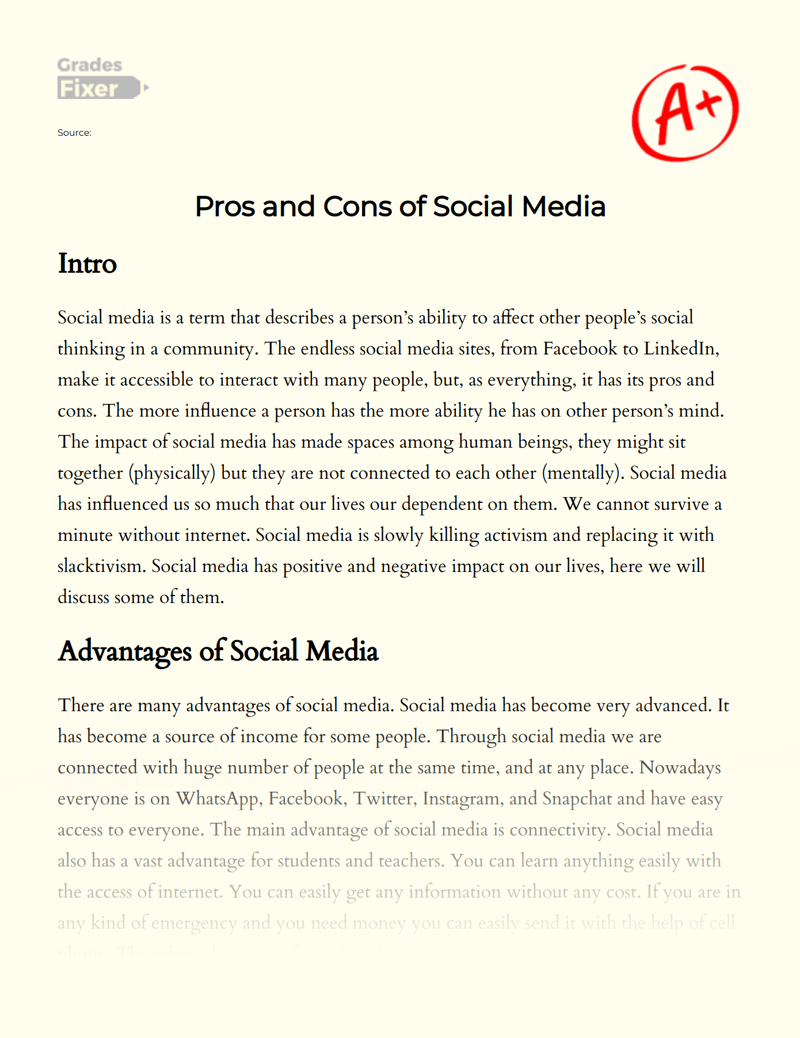
Still can’t find what you need?
Browse our vast selection of original essay samples, each expertly formatted and styled
Related Essays on Social Media
The advent of social media has revolutionized the way we connect, communicate, and share information. The question of the appropriate age for social media access has become a topic of great significance in today's digital age. [...]
“God and Gloria THANK YOU SO MUCH for giving me life! I promise I’ll continue to make the both of you proud of me!”, a simple message Lebron James conducts to his twitter feed that carries a deeper meaning. Lebron is [...]
Social media has a big role towards today’s life and society as the one who has control towards today’s life has already familiar with social media and the uses of it. Society is a concept used to describe the structured [...]
There are many sites which facilitate the sharing of media throughout a community, but a prominent one is YouTube. YouTube is a free video sharing website that makes it easy to watch online videos. You can even create and [...]
Many of the institutions have embarked on embracing new technological models in order to adapt towards the digital revolution which is why the digital divide is decreasing. The term digital equality is coming to surface because [...]
Are people blind to what’s in front of them because of a screen? The use of social media has grown exponentially to the extent of engaging 3.1 billion users worldwide, with more than half of society linked to a form of social [...]
Related Topics
By clicking “Send”, you agree to our Terms of service and Privacy statement . We will occasionally send you account related emails.
Where do you want us to send this sample?
By clicking “Continue”, you agree to our terms of service and privacy policy.
Be careful. This essay is not unique
This essay was donated by a student and is likely to have been used and submitted before
Download this Sample
Free samples may contain mistakes and not unique parts
Sorry, we could not paraphrase this essay. Our professional writers can rewrite it and get you a unique paper.
Please check your inbox.
We can write you a custom essay that will follow your exact instructions and meet the deadlines. Let's fix your grades together!
Get Your Personalized Essay in 3 Hours or Less!
We use cookies to personalyze your web-site experience. By continuing we’ll assume you board with our cookie policy .
- Instructions Followed To The Letter
- Deadlines Met At Every Stage
- Unique And Plagiarism Free

Essay on Pros and Cons of Social Media
Students are often asked to write an essay on Pros and Cons of Social Media in their schools and colleges. And if you’re also looking for the same, we have created 100-word, 250-word, and 500-word essays on the topic.
Let’s take a look…
100 Words Essay on Pros and Cons of Social Media
Introduction.
Social media is a powerful tool used by people worldwide. It has both pros and cons that we will discuss.
Pros of Social Media
Social media allows us to connect with friends and family, share ideas, and learn new things. It’s a great way to stay informed and engaged.
Cons of Social Media
However, it can also lead to cyberbullying, misinformation, and addiction. It can negatively impact mental health and productivity.
It’s important to use social media responsibly, balancing the benefits and drawbacks, to ensure a positive experience.
250 Words Essay on Pros and Cons of Social Media
Social media has become an integral part of modern society, shaping the way we communicate, learn, and engage with the world around us. Yet, it is a double-edged sword, with its advantages and disadvantages intricately linked.
One of the primary benefits of social media is its ability to foster connectivity. It enables individuals to stay in touch with friends and family across the globe, breaking geographic boundaries. Moreover, it serves as a platform for information dissemination and awareness, playing a crucial role in movements like #BlackLivesMatter and #MeToo.
Social media also facilitates learning and professional growth. Platforms like LinkedIn, for instance, enable networking and job hunting, while academic forums provide resources for students and researchers.
Despite its benefits, social media has its share of drawbacks. It can lead to an excessive focus on virtual interactions at the expense of real-life relationships. This over-reliance often results in feelings of loneliness and social isolation.
Additionally, the spread of misinformation is a significant concern. Fake news can propagate rapidly, leading to harmful consequences, as seen during the COVID-19 pandemic.
In conclusion, while social media provides a platform for connectivity and learning, it also poses risks like social isolation and misinformation. It’s essential to use these platforms judiciously, understanding their potential pitfalls.
500 Words Essay on Pros and Cons of Social Media
Social media has become an integral part of our daily lives. It has drastically changed the way we communicate, share information, and even conduct business. While it offers numerous benefits, it also presents several drawbacks. This essay explores the pros and cons of social media, providing a balanced view of this transformative tool.
The Pros of Social Media
Social media has democratized the dissemination of information, making it more accessible than ever. It has become a platform where people can voice their opinions, rally for causes, and effect social change. The Arab Spring is an example of how social media can be used to mobilize and coordinate mass protests.
Another advantage is the connectivity it offers. Social media platforms allow people to stay in touch with friends and family across the globe. It fosters a sense of community and enables the sharing of experiences, ideas, and emotions.
From an educational perspective, social media is a valuable resource. It provides a platform for collaborative learning, academic networking, and knowledge sharing. It also promotes digital literacy, a crucial skill in today’s digital age.
In the business world, social media is a powerful marketing tool. It allows businesses to engage with their customers, gather feedback, and improve their products or services based on consumer preferences.
The Cons of Social Media
Despite its many advantages, social media has its downsides. One of the major concerns is privacy. The vast amount of personal data shared on these platforms can be exploited by malicious entities for identity theft, cyberstalking, or other harmful activities.
Another issue is the spread of misinformation. The ease of sharing information can lead to the rapid dissemination of false or misleading content, which can have serious societal implications, as seen in the ‘fake news’ phenomenon.
The impact on mental health is another significant concern. Excessive use of social media can lead to addiction, decreased productivity, and feelings of inadequacy due to the comparison with others’ lives. Studies have linked heavy social media use to depression, anxiety, and low self-esteem.
Moreover, social media can promote echo chambers, where people are exposed only to views similar to their own, leading to polarization and intolerance.
In conclusion, social media is a double-edged sword. On one hand, it democratizes information, fosters global connectivity, aids in learning, and serves as a powerful tool for businesses. On the other hand, it poses significant privacy risks, facilitates the spread of misinformation, can negatively impact mental health, and contribute to societal polarization. As users, we must navigate this digital landscape with caution, leveraging its benefits while being vigilant of its drawbacks.
That’s it! I hope the essay helped you.
If you’re looking for more, here are essays on other interesting topics:
- Essay on Importance of Social Media
- Essay on Disadvantages of Social Media
- Essay on Who Is Your Role Model
Apart from these, you can look at all the essays by clicking here .
Happy studying!
Leave a Reply Cancel reply
Your email address will not be published. Required fields are marked *
Save my name, email, and website in this browser for the next time I comment.
The Pros and Cons of Social Media for Student Life: Benefits and Potential Pitfalls
Social media has become a crucial component of modern life, altering how people interact, share information, and communicate with one another. Students are particularly affected by social media, which has both benefits and drawbacks that can have a significant impact on their academic and personal lives. This article will discuss the benefits and drawbacks of social networking for college students. We’ll look at the nice things it can do as well as the harmful things students should be aware of.
The Benefits of Social Media for Students
Enhanced communication and connectivity.
The use of social media platforms enables students to communicate with one another in a seamless manner, regardless of where they are physically located. They are able to maintain connections with their contemporaries, share ideas, and work together on initiatives because to this. Students can develop a sense of community and support for one another through the use of instant messaging, group chats, and online forums. These are places where students can discuss their coursework, share ideas, and ask for assistance from other students.
Educational Resources and Learning Opportunities
There is a wealth of instructive material that can be discovered on many social media platforms. Websites like YouTube, Twitter, and LinkedIn are being utilized by a significant number of academic institutions as well as business people in order to disseminate informative ideas, research findings, and educational materials. Traditional classrooms aren’t the only places where students can get an education. They can now get their hands on free e-books, as well as lectures and tutorials.
Writing persuasive essays about the different parts of social media is also a popular topic in the field of social media education. Argumentative essays take a fair look at the pros and cons of social media and how it affects student life. They look at the many different ways social media affects student life. For instance, platforms like GradesFixer provide a diverse range of essay examples that address the complexities of social media’s role in education. Students who want to write their own well-researched and thought-provoking essays on this subject can learn a lot from these examples.
Building a Personal Brand
Building a strong personal brand is more important than ever in this day and age. Social media gives kids the chance to show off their skills, projects, and accomplishments. Students can improve their chances of getting hired by potential employers, getting internships, and working together with other students if they build a trustworthy online profile. Because of this, their jobs will get off to a good start.
Networking and Career Opportunities
Through the use of social media, professionals and students are able to communicate with one another. Students are able to interact with professionals in their field, join relevant communities, and stay abreast of the most recent developments when they use platforms such as LinkedIn . Students can gain a head start on their careers by participating in networking events like these, which can lead to opportunities like internships, mentorships, and even job offers.
The Potential Pitfalls of Social Media for Students
Academic distractions.
The same platforms that offer educational benefits can also become sources of distraction. The constant notifications, trending challenges, and entertaining content can divert students’ attention from their studies. Procrastination and reduced productivity are common consequences of excessive social media use.
Privacy Concerns and Online Security
Sharing personal information on social media comes with risks. Students may inadvertently expose themselves to privacy breaches, cyberbullying, or identity theft. Careless sharing of location, contact details, or sensitive data can have serious repercussions.
Mental Health Impact
Pressure from social media to show an idealized picture of oneself can be hard on mental health. The feeling of not being good enough, anxiety, and depression that can come from constantly comparing yourself to your online image can be called “social media depression.”
Fear of Missing Out (FOMO)
People’s lives on social media are often skewed because they focus on the exciting and good parts. This can make students feel like they’re missing out because they think their own lives are boring. FOMO can make people do things or go to events on the spur of the moment just to look like they are involved.
Striking the Balance: Healthy Social Media Usage
To harness the benefits of social media while mitigating the risks, students should adopt a balanced approach. Setting clear usage limits, practicing digital detoxes, and prioritizing offline interactions are essential strategies. By being mindful of their online behavior, students can maintain a healthier relationship with social media.
Expert Tips for Students to Navigate Social Media
Set clear usage limits.
Establish specific time slots for social media use and adhere to them. This helps in preventing overindulgence and maintaining focus on academic responsibilities.
Be Mindful of the Content You Consume
Consciously choose to engage with content that adds value to your life. Unfollow accounts that promote negativity or have no educational or inspirational significance.
Cultivate a Positive Online Presence
Share content that reflects your true self and interests. Positivity and authenticity attract like-minded individuals and opportunities aligned with your goals.
Real-Life Stories: How Social Media Impacted Students
College student Jessica says that social media helped her find a guide in the field she wanted to work in. She met an expert in her field through LinkedIn, who gave her advice about her job. This connection not only gave her useful information, but it also gave her access to internships and workshops she wouldn’t have known about otherwise.
Emma, another student, worked on a study project with classmates from different countries by using social media. They met through an online academic group and were able to combine their different points of view and areas of expertise to make a thorough research paper. This showed how social media can help people from all over the world work together.
The Future of Social Media in Student Life
As technology gets better, so will the role of social media in a student’s life. Students may have more engaging ways to learn, better ways to work together, and a bigger focus on digital etiquette. More virtual reality classrooms, interactive study groups, and AI-driven tailored learning routes could revolutionize how students interact with educational material.
Social media is like a double-edged sword for kids, because it can be both helpful and harmful. Students can use it to help them in school and in their future jobs if they use it wisely and carefully. To do well in the digital world, you need to find a balance between your online and real life.
About The Author
Matthew Torainn
Related posts.

9 Tips You Need to Write and Respond to Emails Professionally

12 Rules of Writing Emails Professionally and Effectively
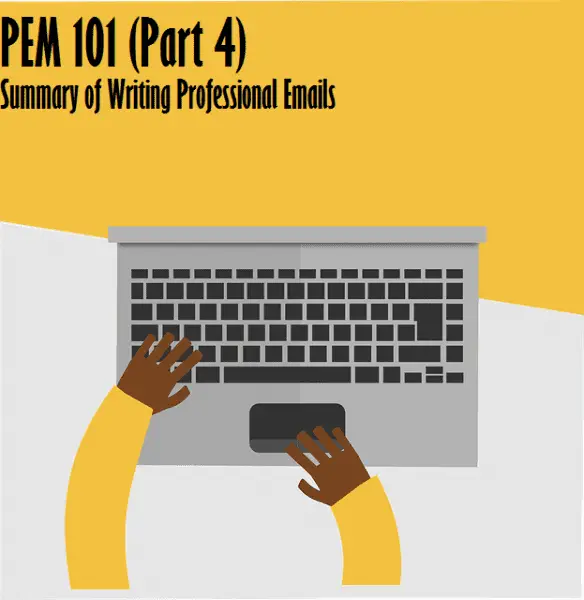
How to Write Professional Emails: 7 Critical Ingredients

8 Simple Lessons for Writing Irresistible Business to Business Emails
Leave a comment cancel reply.
Your email address will not be published. Required fields are marked *
Save my name, email, and website in this browser for the next time I comment.
Essay on Social Media for School Students and Children
500+ words essay on social media.
Social media is a tool that is becoming quite popular these days because of its user-friendly features. Social media platforms like Facebook, Instagram, Twitter and more are giving people a chance to connect with each other across distances. In other words, the whole world is at our fingertips all thanks to social media. The youth is especially one of the most dominant users of social media. All this makes you wonder that something so powerful and with such a massive reach cannot be all good. Like how there are always two sides to a coin, the same goes for social media. Subsequently, different people have different opinions on this debatable topic. So, in this essay on Social Media, we will see the advantages and disadvantages of social media.

Advantages of Social Media
When we look at the positive aspect of social media, we find numerous advantages. The most important being a great device for education . All the information one requires is just a click away. Students can educate themselves on various topics using social media.
Moreover, live lectures are now possible because of social media. You can attend a lecture happening in America while sitting in India.
Furthermore, as more and more people are distancing themselves from newspapers, they are depending on social media for news. You are always updated on the latest happenings of the world through it. A person becomes more socially aware of the issues of the world.
In addition, it strengthens bonds with your loved ones. Distance is not a barrier anymore because of social media. For instance, you can easily communicate with your friends and relatives overseas.
Most importantly, it also provides a great platform for young budding artists to showcase their talent for free. You can get great opportunities for employment through social media too.
Another advantage definitely benefits companies who wish to promote their brands. Social media has become a hub for advertising and offers you great opportunities for connecting with the customer.
Get the huge list of more than 500 Essay Topics and Ideas
Disadvantages of Social Media
Despite having such unique advantages, social media is considered to be one of the most harmful elements of society. If the use of social media is not monitored, it can lead to grave consequences.

Thus, the sharing on social media especially by children must be monitored at all times. Next up is the addition of social media which is quite common amongst the youth.
This addiction hampers with the academic performance of a student as they waste their time on social media instead of studying. Social media also creates communal rifts. Fake news is spread with the use of it, which poisons the mind of peace-loving citizens.
In short, surely social media has both advantages and disadvantages. But, it all depends on the user at the end. The youth must particularly create a balance between their academic performances, physical activities, and social media. Excess use of anything is harmful and the same thing applies to social media. Therefore, we must strive to live a satisfying life with the right balance.

FAQs on Social Media
Q.1 Is social media beneficial? If yes, then how?
A.1 Social media is quite beneficial. Social Media offers information, news, educational material, a platform for talented youth and brands.
Q.2 What is a disadvantage of Social Media?
A.2 Social media invades your privacy. It makes you addicted and causes health problems. It also results in cyberbullying and scams as well as communal hatred.
Customize your course in 30 seconds
Which class are you in.

- Travelling Essay
- Picnic Essay
- Our Country Essay
- My Parents Essay
- Essay on Favourite Personality
- Essay on Memorable Day of My Life
- Essay on Knowledge is Power
- Essay on Gurpurab
- Essay on My Favourite Season
- Essay on Types of Sports
Leave a Reply Cancel reply
Your email address will not be published. Required fields are marked *
Download the App


Is Social Media Good or Bad for Students?
The benefits of a more connected world through social media far outweigh the downsides. With proper education about the dangers of social media, the downsides can be mitigated. As with all advances in the way we lead our lives, it’s never a clear path!
Remember when they said the internet would close all libraries? I say this because I am currently sat in a library writing this!
Allowing young people to connect with others all over the world will teach them so much and help them become more rounded individuals.
Before the Digital Era and the Rise of Social Media, life used to be pleasurable and straightforward, with no pressure of constantly updating your life. Everything you do use to be personal to you, with no fear of getting hacked or data leakage.
With the continued and increasing dominance of social media, the way of communication has changed.
You can communicate with anyone you like just in a couple of clicks.
Social media has shrunk physical distance and has made people closer than ever before. You can now move to any part of the world without fear of being far away from your family members and loved ones.
According to Statista, currently, there are more than 3.6 billion social media users worldwide. And this number is projected to increase by 0.81 billion by 2025.
According to Statista, here are the most popular social media site by the end of January 2022:
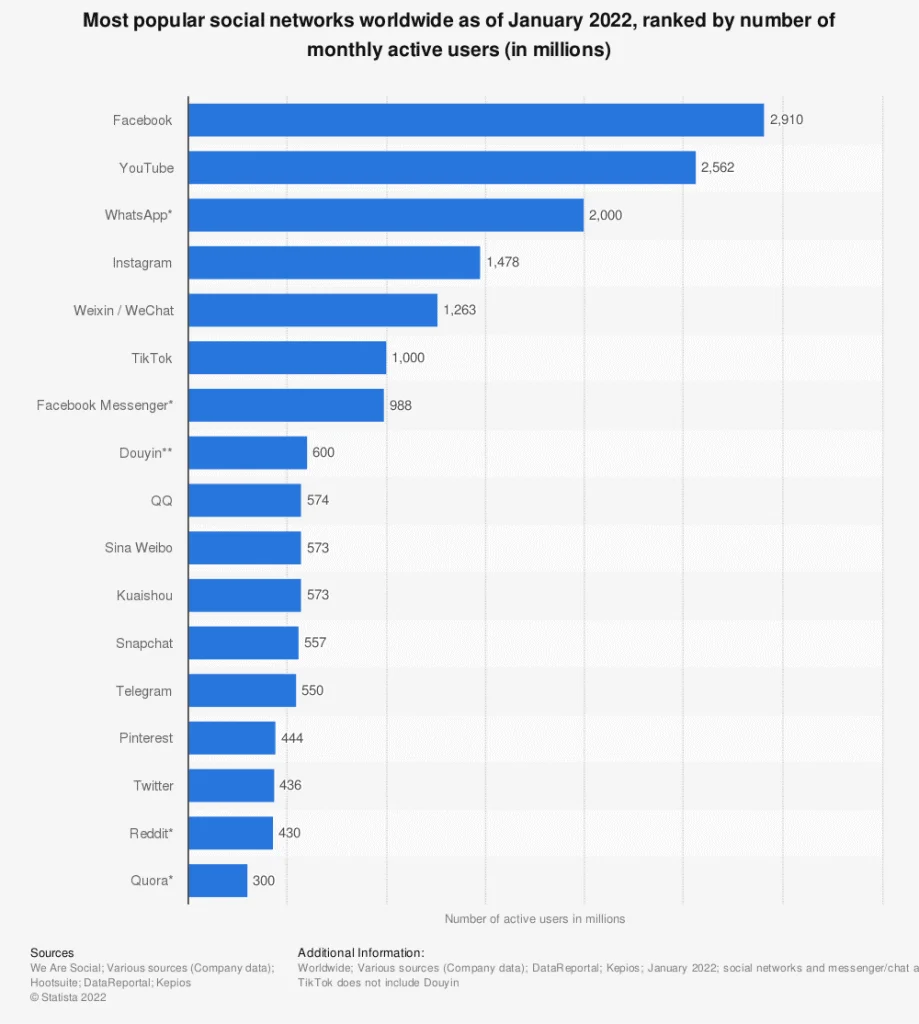
How Old Are the People Using Social Media?
People in the age group 18 to 30 are the biggest social media users, most of them being students. Here, the data prepared by Pew shows social media users according to the age:
The increase in the number of students on social media has changed the education system . Social Media has both positive and negative impacts on students .
Here we discuss the Pros and Cons of Students using Social Media
How Is Social Media Useful for Students?
- Social media connects people from across the globe.
- Social media makes education more accessible for all students.
- Connection with family and friends is easy and simple, regardless of physical distance.
- Young people can showcase their individual talents much easier with social media platforms.
- Social media allows young people to get a more unbiased view of current affairs by having multiple sources at their fingertips.
- Job opportunities are more accessible, both in social media itself and any other career path.
Social Media Connects Students From All Over the World
Social media is all about connecting people from all around the world. There are no geographical boundaries when it comes to connecting people through social media.
For many students, social media has been useful for connecting students studying the same courses as they are.
If you are a student, you may have come across many social media groups created to connect students studying the same subject as you are.
Students solve each other’s problems in such groups and share their experiences while learning a particular subject or topic.
You may also share much other important information like the scope of subjects you are studying, job opportunities, etc. This kind of data can be helpful for the group members.
Moreover, social media can also provide a platform for students’ exchange programs that many colleges and universities offer.
How Can Social Media Platform Connect Students With Teachers?
With specific education “social media” platforms such as Google Classroom , Zoom and Google Hangouts, teachers can connect and educate students remotely.
Social media provides a platform to connect students and provides a platform to connect students and teachers. Social media has made it easy for students to solve their queries anytime they want.
Now students do not have to make an appointment with their teachers to solve their queries. This can be either through built-in secure messaging or via in-app class chats, e.g. in Google Classroom .
This is beneficial not just for students but also for teachers, as sometimes when teachers cannot physically meet students, they can give effective feedback and assistance assignments through these platforms.
Furthermore, they can even conduct classes through social media. You might have come across many YouTube channels of teachers to make videos related to their subject matters. This has made the teaching and learning process easier and effortless for both students and teachers.
How Does Social Media Connect Students With Family Members?
Social media can connect students with family, regardless of physical location and with the advent of platforms such as Zoom , Google Hangouts and Microsoft Teams, multiple people can have a video conversation at the same time.
This is a huge benefit of social media among students, especially those living away from home, either at university or boarding school.
You may be aware that some of your students are living away from their homes. Students can get homesick if they do not habitually stay away from their house.
If the Covid pandemic has taught us anything it’s that connection with those we love is something that we all need.
Social media has reduced this physical distance by being a medium of connecting students with their family members.
There are so many video-calling photo-sharing educational apps now that the world feels smaller, the distances reduced.
Can Social Media Provide a Platform to Showcase Talent?
Platforms such as YouTube and TikTok can easily and inexpensively allow young people to showcase their talents and launch very profitable careers. Anything from singing to dancing, from baking to making, there is an audience out there.
You cannot deny that social media is one of the biggest platforms to showcase up and coming talent. Many students are using social media to show their hidden talent.
YouTube videos of children, teenagers, and even adults showing off their talents are now commonplace, in fact, many YouTube channels have launched successful careers.
From singing to dancing, reciting poetry to cooking, there are students out there making waves and showing the world what they can do.
One of the best things about making a career through social media is it requires zero investment. And importantly, it has potentially global attention.
As teachers we strive to help our students become the best version of themselves, surely this form of social media feeds right into this?
How does Social Media Provide a Broad Range of Opportunities?
Social media job boards provide up to date relevant job opportunities more efficiently than before. Also, the rise of social media has created a wealth of job opportunities itself. There is also the role of brand influencers which is a whole new avenue of opportunity.
These days social media is not just used for communication. It has been working as a pool for both job seekers and job providers.
There are even groups on social media that are specifically created to post about job opportunities that students of working age can do.
Moreover, social media has been one of the best platforms for business students to conduct and grow their businesses.
From Facebook Groups to Telegram chats, there is support, help and opportunities that would simply be out of reach without social media.
Students Can Use Social Media to Keep Up To Date With Current Affair s
Gone are the days where the only current affairs students had access to was their parent’s newspaper of choice. Now young people can keep up to date with news from a global melting pot of news agencies, that may report on something not covered in their own country.
You might have come across many posts on social media where people share current affairs. Obviously, we should instil a sense of objectivity in our students.
If we prepare students to spot biases and agendas, “Fake news” will become less of an issue.
Similarly, many news channels are sharing breaking news and other important current news on social media platforms.
Students do not need to read a newspaper or sit in front of the TV to watch the news. They can read or watch the news anytime they want.
What are the Drawbacks of Social Media for Students?
- Social Media can reduce the time spent on studies.
- The “perfect life/body” images can lead to low self-esteem in young people through social media.
- Bullying has moved to an online arena which is more difficult to track and remedy.
- Cases of teenage anxiety and depression are rapidly rising. There are strong links to social media being, in part to blame.
- Social media is 24/7 and young people can lack the maturity to switch off, leading to sleep deprivation.
- A reduction of physical activity is a real effect of social media. Even “hanging out” with friends is now commonly done over social media.
Reduced Concentration on Studies
Many parents agree that social media has been one of the main reasons for a decline in their kids’ academic performance.
You may have experienced this yourself; whenever you start to study, you get distracted by your notifications from social media.
Whenever you try to work or learn, you constantly check social media, thinking you might be missing some significant events.
Lowers Self-Esteem Among Children
It’s well understood that the life painted on most social media channels is not a true reflection of someones actual life. As adults, we understand this and take it with a pinch of salt.
This is not the case with children !
Children lack the life experience to be objective in what they see on social media.
They compare themselves with the “perfect” bodies and lifestyles they see and this can heavily contribute to low self-esteem and can lead to further problems affecting their mental health.
Social media influencers try to show “ The Most Perfect ” lifestyle, which a student cannot afford and start making students feel inferior about themselves.
Cyberbullying and Cyberstalking
One of the biggest and most dangerous issues students face while on social media is cyberbullying and cyberstalking.
Cyberbullying is one of the biggest problems among teenagers in schools. Students used to bully each other physically; now the bullying has moved to the virtual world.
Kids usually bully their peers whenever they post some picture or status on social media. They even harass your kids and blackmail them, which reduces kids’ self-confidence.
Online cyberbullying is even worse because it is not done face to face so people can easily say things that they wouldn’t dare say in person.
These instances of serious cyberbullying can and have, in many cases lead to teen suicide.
There are some brilliant charities that give help and advice around cyberbullying, cybersmile.org is a great international example.
Social Media is a Big Cause of Anxiety and Depression in Children
This point is related to the issues mentioned above. Unfortunately, cases of anxiety and depression in children are rising rapidly.
It is commonly assumed that the rise of social media platforms is a driving factor behind this.
In the UK the statistics are frightening, to say the least; youngminds.org.uk reports the following:
- 1 in 8 children have a diagnosable mental health disorder – that’s roughly 3 children in every classroom.
- 1 in 6 young people aged 16-24 has symptoms of a common mental disorder such as depression or an anxiety disorder.
- Half of all mental health problems manifest by the age of 14, with 75% by age 24.
- In 2017, suicide was the most common cause of death for both boys (16.2% of all deaths) and girls (13.3%) aged between 5 and 19.
- Nearly half of 17-19-year-olds with a diagnosable mental health disorder has self-harmed or attempted suicide at some point, rising to 52.7% for young women.
Whilst these statistics are for the UK, they are mirrored in many other countries, where social media is common.
Sleep Deprivation
As a working teacher in the UK, I have noticed over the last few years that more and more of my students are reporting to be awake long into the night and in some cases the early hours of the morning.
Students can spend the whole night on their social media, chatting and posting random pictures and videos.
When I have spoken to my students about it, the most common thing I hear is that they didn’t want to miss out on anything (gossip, chat etc).
This FOMO (fear of missing out) is driven by their worries of being ostracized if they don’t know what happened “in the chat”.
This lack of sleep sadly has two major effects on students. Their academic progress suffers as well as their mental health.
Top Tip: Turn your wifi off when you go to bed (or earlier) then you know your children are not online all night!
Reduces Physical Activities
These days many students log in to their social media in their free time. As soon as they have some time, they get on their social media, reducing their physical exercise.
Students are either spending their time on their studies or their social media. Many children prefer to stay inside their room all day and night and use their devices instead of going out to get some fresh air, even if it is just for a walk.
How to Protect Students from Social Media (For Parents)?
- Communicate and educate young people about the benefits and dangers of social media.
- Use parental control platforms such as Google Family Link .
- Only allow young people to use a social media platform when they are old enough (many platforms require a user to be 13).
- Encourage young people to make their profiles private and only talk to people they already know.
If you are a parent, you might be worried about protecting your kids away from the dark side of social media. Adults might understand their dark side of social media, but kids and teenagers may not have the perspective adulthood gives us.
Communicate With Your Kids About the Dangers of Social Media
Communication is the key to solving any problem. As a teacher or parent, you should communicate with your kids about the dark side of social media. It would be best to make them aware of what happens when they use social media for a long time.
You should guide them on using social media and taking advantage of it and what things they should avoid, thus turning social media into a benefit.
Use of Parental Control Software
Sometimes, even when you communicate with your kids about social media, they might ignore you. Even when your kids are aware of social media, they may use it all the time.
To know what your kids are doing on social media, you can use parental control apps. Parental control apps help you to monitor your kids what your kids are doing on their devices.
Some parental control apps monitor your kid’s social media activities like their post, comments, messages, etc. They even show you random screenshots of your kid’s device activities.
One of my personal favorite parental control apps is fenced.ai which helps you monitor your kid’s online activities.
Restrict the Use of Some Social Media Sites
If your kids are using social media apps beyond their age limit, you should block such websites from your kid’s device.
It would help if you talked to your kids about using social media and their age limit to join social media.
Most social media requires an age limit of 13; it’s better to restrict kids from using social media until 13.
Encourage Your Kids To Make their Social Media Private
Many students, especially teenagers, make their social media public gain more followers and likes.
In short, to gain popularity on social media, kids and teenagers add random people on social media and make their posts public.
As adults, we can immediately see the danger here, but again, for teenagers the risk/reward ratio is different!
Thus, always encourage your kids to make their social media private and only add people they know in their real life.
Overall, it can be said that social media can be both detrimental and a benefit for students. It all comes down to education and being lead by responsible adults
Is Social Media Good or Bad for Students? FAQ
Social media can be both beneficial and detrimental. As with most new innovations, used correctly, it can be great, used poorly, it leads to problems. Regardless of the answer, the important thing is teachers and parents must lead by example and educate students.
Social media helps connect students studying the same subject in different parts of countries or even the world. Students can use social media to interact with their teachers, getting feedback on their work. Caveat : This interaction should only ever be conducted on school-approved social media like Google Hangouts or Microsoft Teams. NEVER INTERACT WITH STUDENTS ON YOUR PERSONAL SOCIAL MEDIA ACCOUNTS!
Similar Posts:
- Preschool – Everything You Need to Know
- Guide on College and University Admissions
- 25 Tips For Improving Student’s Performance Via Private Conversations
2 thoughts on “Is Social Media Good or Bad for Students?”
so i agree and disagree at the same time because social media can really help you at some points and some times it can make you feel really bad about yourself and your physical appearance , people are open to do anything they want on the internet and it will most likely be allowed unless its some graphic type of content so im in the middle of agreeing and disagreeing at the same time.
My parents completely agree with this article. I am not allowed to get a phone until 9th grade at the least, and after things I have heard, I think this is a good idea. We are allowed onto specific websites and are blocked from others, and though that can get annoying when I search up videos about things for school projects, it’s the wisest thing to do.
Leave a Comment Cancel reply
Save my name and email in this browser for the next time I comment.

The Pros and Cons of Social Media for Youth
A new review article looks at how social media affects well-being in youth...
Posted October 16, 2021 | Reviewed by Lybi Ma
- Social media has both positive and negative effects on well-being in youth.
- Social media impacts four distinct areas for youth: connections, identity, learning, and emotions.
More than 90 percent of teenagers in the U.S. have a smartphone. Access to this type of technology and social networking changes the playing field for young people who are simultaneously developing a sense of identity and new social relationships.

We have certainly heard about the downside of teens and smartphones: cyberbullying, anxiety , and a misrepresented sense of body image . Research demonstrates there are some benefits too, including the ability to keep in touch with friends and loved ones – especially when the COVID-19 pandemic limited in-person social interactions.
A new systematic review published in the journal Adolescent Research Review combines the evidence from qualitative studies that investigate adolescent social media use.
The authors found, in short, that the links between adolescent well-being and social media are complicated and depend on a broad range of factors.
“Adults have always been concerned about how the latest technology will harm children,” said Amanda Purington, director of evaluation and research for ACT for Youth in the BCTR and a doctoral candidate in Cornell’s Social Media Lab. “This goes back to radio programs, comic books, novels – you name it, adults were worried about it. The same is now true for social media. And yes, there are concerns – there are many potential risks and harms. But there are potential benefits, too.”
Reviewing 19 studies of young people ages 11 to 20, the authors identified four major themes related to social media and well-being that ultimately affected aspects of young people’s mental health and sense of self.
The first theme, connections, describes how social media either supports or hinders young people’s relationships with their peers, friends, and family. The studies in the review provided plenty of examples of ways that social media helped youth build connections with others. Participants reported that social media helped to create intimacy with friends and could improve popularity. Youth who said they were shy reported having an easier time making friends through social media. Studies also found social media was useful in keeping in touch with family and friends who live far away and allowing groups to communicate in masse. In seven papers, participants identified social media as a source of support and reassurance.
In 13 of the papers, youth reported that social media also harmed their connections with others. They provided examples of bullying and threats and an atmosphere of criticism and negativity during social media interactions. Youth cited the anonymity of social media as part of the problem, as well as miscommunication that can occur online.
Study participants also reported a feeling of disconnection associated with relationships on social media. Some youth felt rejected or left out when their social media posts did not receive the feedback they expected. Others reported feeling frustrated, lonely , or paranoid about being left out.
The second theme, identity, describes how adolescents are supported or frustrated on social media in trying to develop their identities.
Youth in many of the studies described how social media helped them to “come out of their shells” and express their true identities. They reported liking the ability to write and edit their thoughts and use images to express themselves. They reported that feedback they received on social media helped to bolster their self-confidence and they reported enjoying the ability to look back on memories to keep track of how their identity changed over time.
In eight studies, youth described ways that social media led to inauthentic representations of themselves. They felt suspicious that others would use photo editing to disguise their identities and complained about how easy it was to deliver communications slyly, rather than with the honesty required in face-to-face communication. They also felt self-conscious about posting selfies, and reported that the feedback they received would affect their feelings of self-worth .
The third theme, learning, describes how social media use supports or hinders education . In many studies, participants reported how social media helped to broaden their perspectives and expose them to new ideas and topics. Many youths specifically cited exposure to political and social movements, such as Black Lives Matter.

On the flip side, youth in five studies reported that social media interfered with their education. They said that phone notifications and the pressure to constantly check in on social media distracted them from their studies. Participants reported that they found it difficult to spend quiet time alone without checking their phones. Others said the 24-7 nature of social media kept them up too late at night, making it difficult to get up for school the next day.
The fourth theme, emotions, describes the ways that social media impacts young people’s emotional experiences in both positive and negative ways. In 11 papers, participants reported that social media had a positive effect on their emotions. Some reported it improved their mood, helped them to feel excited, and often prompted laughter . (Think funny animal videos.) Others reported that social media helped to alleviate negative moods, including annoyance, anger , and boredom . They described logging onto social media as a form of stress management .
But in nearly all of the papers included in the review, participants said social media was a source of worry and pressure. Participants expressed concern about judgment from their peers. They often felt embarrassed about how they looked in images. Many participants expressed worry that they were addicted to social media. Others fretted about leaving a digital footprint that would affect them later in life. Many participants reported experiencing pressure to constantly respond and stay connected on social media. And a smaller number of participants reported feeling disturbed by encountering troubling content, such as self-harm and seeing former partners in new relationships.
“As this review article highlights, social media provides spaces for adolescents to work on some of the central developmental tasks of their age, such as forming deeper connections with peers and exploring identity,” Purington said. “I believe the key is to help youth maximize these benefits while minimizing risks, and we can do this by educating youth about how to use social media in ways that are positive, safe, and prosocial.”
The take-home message: The body of evidence on social media and well-being paints a complicated picture of how this new technology is affecting youth. While there are certainly benefits when young people use social media, there is also a broad range of pressures and negative consequences.

The Bronfenbrenner Center for Translational Research at Cornell University is focused on using research findings to improve health and well-being of people at all stages of life.
- Find a Therapist
- Find a Treatment Center
- Find a Psychiatrist
- Find a Support Group
- Find Teletherapy
- United States
- Brooklyn, NY
- Chicago, IL
- Houston, TX
- Los Angeles, CA
- New York, NY
- Portland, OR
- San Diego, CA
- San Francisco, CA
- Seattle, WA
- Washington, DC
- Asperger's
- Bipolar Disorder
- Chronic Pain
- Eating Disorders
- Passive Aggression
- Personality
- Goal Setting
- Positive Psychology
- Stopping Smoking
- Low Sexual Desire
- Relationships
- Child Development
- Therapy Center NEW
- Diagnosis Dictionary
- Types of Therapy

Understanding what emotional intelligence looks like and the steps needed to improve it could light a path to a more emotionally adept world.
- Coronavirus Disease 2019
- Affective Forecasting
- Neuroscience
Social Media Essay: Benefits and Drawbacks of Social Networking Sites
The advent of various social media channels has revolutionized the internet landscape by introducing us to global networking. Today, an individual can connect with another in a completely different part of this world just in a matter of seconds. We will take you through various notions and opinions associated with social media and how they impact our everyday lives. Also, there are some incredible tips to give you a better insight into how to write a social media essay.

Sep 03 2020 ● 8 min read
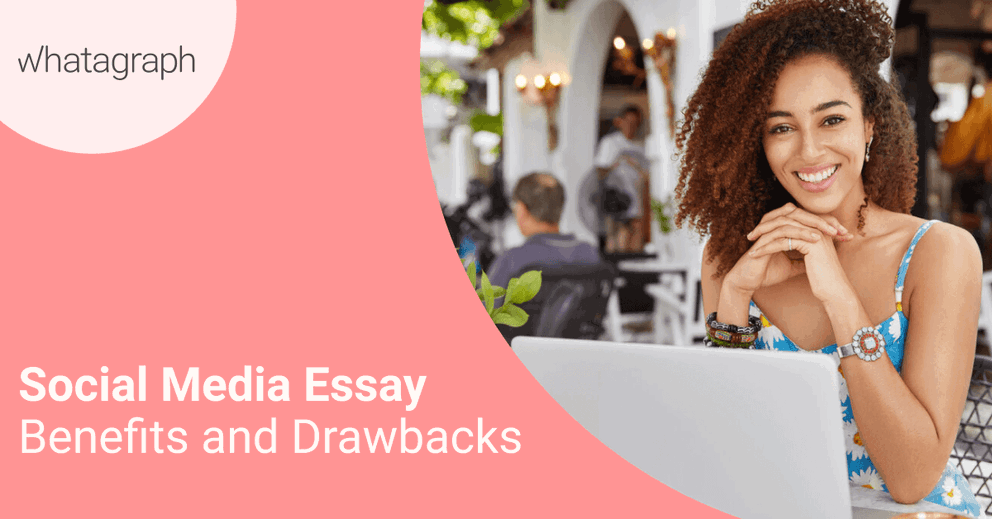
Table of Contents
What is social media essay.
As you know, an social media essay is a piece of writing that is used to introduce an essential topic to the world with its underlying advantages and disadvantages. These aspects are driven solely by facts and should not contain the opinions of the writers. It is drafted to give others a better understanding of the subject in hand.
No matter which subject it pertains to, an essay ends with a conclusion where the writers are permitted to give their opinion after weighing the advantages and disadvantages.
Similarly, a social media essay is written to appreciate the positive aspects and highlight the negative impacts of social media in this time and day. The conclusions include the analysis of the two elements by the writers in their own lives and give an open-ended point of view. Depending upon the essay writer or paper writing service , the decision can be decisive, too, but that is not encouraged.
How do you write a social media essay?
Today, the use of social networks, whether it is Facebook, Twitter, Snapchat, Instagram, or LinkedIn, has increased exponentially. An average millennial spends 2 hours and 58 minutes per day on social media platforms like Facebook. While some say that the platform is super-informative, others argue that all the information gathered on this platform is trivial and doesn't justify long hours invested in the use of social media.
The above arguments make using social media by individuals with a debatable issue, and this is why a lot of students are required to write an essay on social media. So, here are some incredible tips to help you out in writing an essay on social media even if you don't have marketing skills .
Structure of Social Media Essay
A classic essay consists of 3 parts – the introduction, main body, and the conclusion.
- The Introduction
As you introduce the main topic, always begin with how it is relevant to the current scenario. You can do this by providing some background information. The information can be made richer by adding some reliable stats and data . Once you have established the topic, you need to give a strong thesis statement of the hypothesis on which your essay is based.
The thesis statement in your essay should be precise and debatable. If not, the arguments that you are going to put forward in the essay would make no sense.
The main body of your text should consist of logical arguments in relevance to your hypothesis. Make sure you put forward one statement in one paragraph and start a new one with another section. This will make your essay look more organized.
Also, when developing ideas, only include the ones you can write clearly about. If not, avoid them. Make sure that the essay develops coherently.
To conclude the essay about social media, bring back your hypothesis, and state how the aspects you discussed earlier support or nullify it. Make it a point to summarize all ideas, but do not start adding more ideas when you are about to conclude. You can now give an, ideally, open end to your essay.
A great conclusion is the one that provokes thought and will make your readers question the use of social media in their everyday lives.
Also, remember that essays do not have to include pros and cons always. They can either be full of pros or cons or both, depending upon your hypothesis. Just ensure they are relevant.
Various tones of a social media essay
You might believe that an essay is an essay, and two of them would be similar, but that's a misconception. Different essays have varying tones depending on how the author is treating the thesis statement through the main body of the text. Here are a few examples of essays on social media in different tones.
- Sample of a Persuasive Essay
If you are asked to write an academic paper about the effects of social media on the mental health of teenagers and young adults, you should make it persuasive. For this, just writing about the topic is not enough. It would help if you had an impactful thesis, followed by powerful arguments to support or question your theory.
The perils associated with social media addiction are forcing parents and "grown-ups" to throw their benefits in bad light today. In the race to become best in academics and non-academic activities, people are losing their grip on how social networks bring people together. They empower individuals with knowledge about various cultures and languages, which might not have been possible otherwise.
Social media sites can be addictive, and students might waste their formative years scrolling through the trivial feed and gain nothing but superficial knowledge. But that is just because neither parents nor the school is encouraging positive social media behavior. If these institutions start offering tips to students to limit and utilize their time on social media , one would be amazed to see their achievements.
Is social media a catalyst for the downfall of student life? Well, social media sites like Facebook, YouTube, Twitter, Instagram, and more are teeming with inspirational achievers and content creators who go the extra mile to share their stories and inspire students. If the children are taught to see their access to social media as an opportunity to grow rather than a competition for likes and followers, they are bound to work harder and achieve goals that seemed insurmountable earlier.
- Sample of Negative Essay about social media
If you have been asked to highlight the negative aspects of social media, your teacher does not mean that you have to cross all limits to present the use of social media in a bad light. Instead, what they are asking for is some logical and believable arguments that tell us why social media is harmful to society.
Social media is destroying family links by creating a virtual shell for each individual, which dissociates them with their own parents and siblings. The kids are adversely affected by increased access to social media if parents are always indulged in their devices and ignore them. Eventually, even kids start using tools to connect to other people, ignoring their family members.
Since kids and teenagers are the most impressionable age groups, they start believing that everything that glitters on social media platforms is gold, and they become materialistic. Their lives start revolving around likes, comments, and followers/subscribers. No matter whether their minds are prepared for such exposure or not, social media exposes them to the best and the worst about this world, which might turn them into rebels. They start valuing their online friends more than their offline lives and go to unimaginable extents to keep them entertained.
So, parents and elders need to pay attention to their children and limit their social media use so that they can learn to form real relationships and values.
- Weighing the pros and cons
Another way in which you can present your social media essay is by comparing the positive and negative aspects associated with it. In such essays, the conclusion is better left open for the readers to decide their own take on social media.
One cannot argue that social media has taken the world by storm by allowing like-minded individuals to connect and share their experiences with the world. You can use these platforms to make new friends and discover the ones who have lost touch. You can talk to everyone on your friend list and share your content on these channels to become a part of the creators' community. There is no dearth for talent on social media and its admirers.
On the other hand, if you use social media sites for long stretches of time in one go, you run the risk of addiction. Gradually, a social media addict starts to build a cocoon for themselves, which they find hard to step out of. This leads to a disconnect between you and the family you already have and love. One might feel too confined yet comfortable in their space that they have no urge left to step out, pushing them towards social seclusion, or worse – depression.
When you flip the coin again, you will discover that social media has become an incredible platform for small businesses to grow and earn good profits . The grass-root companies do not have to invest much for advertising and promotion or even own an establishment. All they have to do is to create a grassroots marketing strategy for themselves, and their brand will start selling in no time!
In the end, social media is a game-changer on the World Wide Web. It allows people to connect with the virtual world with the risk of disconnecting with the real world. Then again, businesses are doing well on these platforms. There are indeed two sides to social media, one positive and another negative, and it is up to you which one you lean towards more.
- Argumentative social media essay
A challenging but equally exciting type of essay on social media you should know about is an argumentative essay. It is often written when you are tasked with altering the point of view of the reader, which is of a completely opposite belief. Here is a sample for your better understanding.
Social networks have an uncertain future with the string impression they leave on users, especially the younger generations. Parents panic with the first mention of social media sites by their children and learning about their presence on these platforms because they are afraid of cyberbullying. They do not want their children to get cat-fished by some stranger on Reddit when they are not around.
Moreover, social media platforms are the reason why several individuals are losing their confidential data every day to corporate houses. These businesses are using the information to bug users with ads about stuff they do not want to buy.
If such instances carry on, the day is not far when the government will start to keep checks on the likes of Twitter, Facebook, Instagram, and other channels. Massive surveillance will be imposed on these sites to prevent malicious minds from harming innocent teenagers physically or by hacking into their systems. So, before you get a chance to ask " have I been hacked ", know that someone is taking care of it.
Incorporate an Attractive Topic
Having an attractive topic for your social media essay does not mean using poetic words in it. You should have an issue relevant to the current scenario. In the process of selecting a fascinating topic, do not forget to keep it within the extents of your knowledge. If it becomes too complicated for you to write about, you will be stuck when coming up with arguments and ideas.
The perfect topic would be the one which offers good potential for research and is interesting for the readers too. Even if you present profound arguments about such topics, they should be in a logical, comprehensible, and readable format for people to understand easily.
Writing a social media essay is no cakewalk, whether you are a high-school student or university student. All you need to do is, structuralize it properly, be clear with the ideas and arguments you are planning to present, pick the tone of your essay, and began writing. Do not forget to top your essay up with a catchy topic so that your entire hard work doesn't fall flat.
Published on Sep 03 2020
Gintaras is an experienced marketing professional who is always eager to explore the most up-to-date issues in data marketing. Having worked as an SEO manager at several companies, he's a valuable addition to the Whatagraph writers' pool.
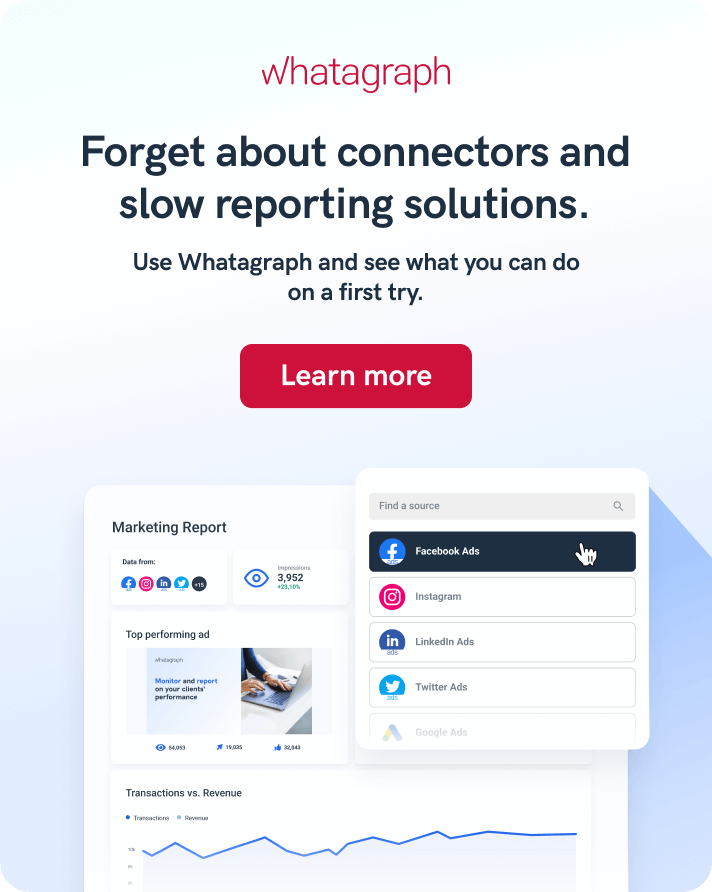
Related articles

Data analytics · 7 mins
Data Blending: Clear Insights for Data-Driven Marketing
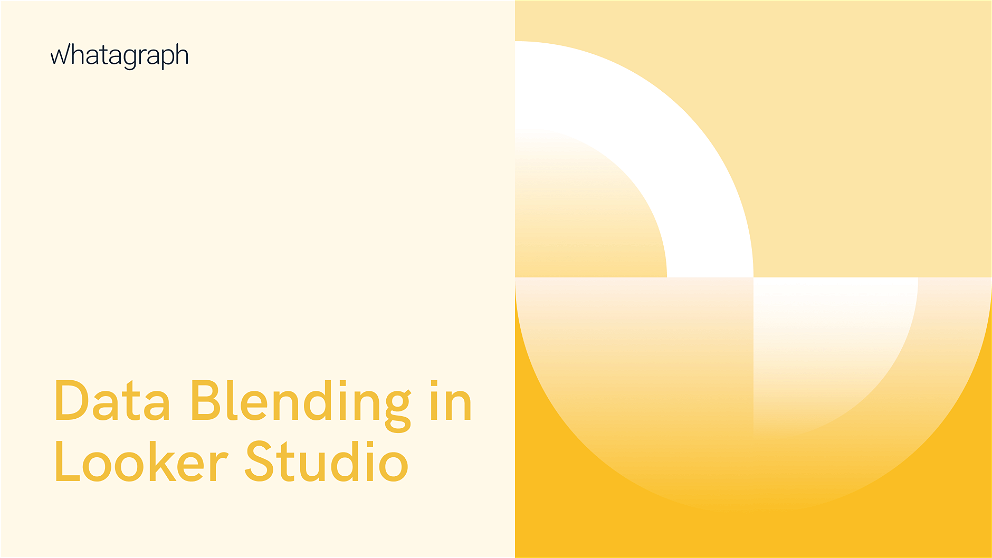
Blending Data in Looker Studio? Here’s a Faster and More Reliable Alternative

Marketing Data Transformation: How to Organize Unstructured Marketing Data?
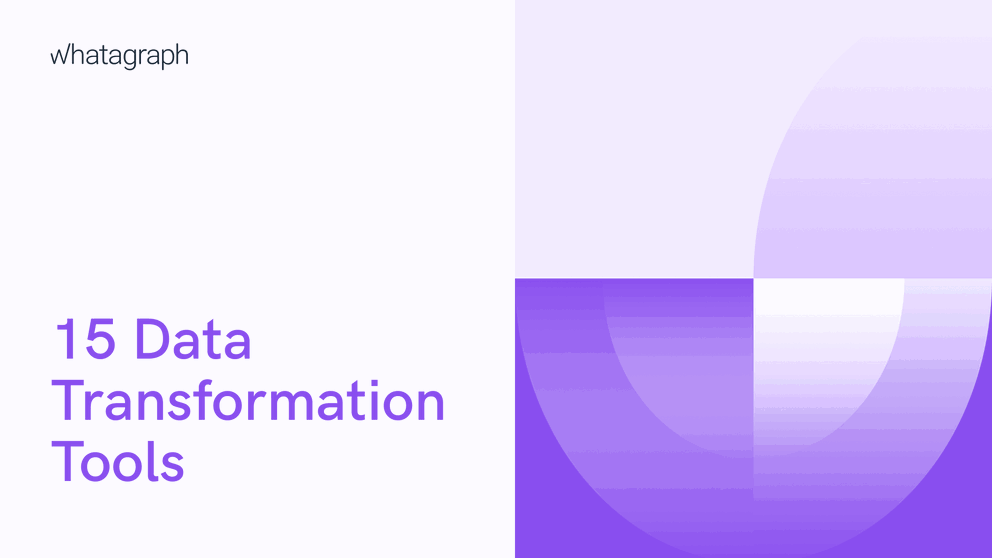
Top 15 Data Transformation Tools for Marketers in 2024
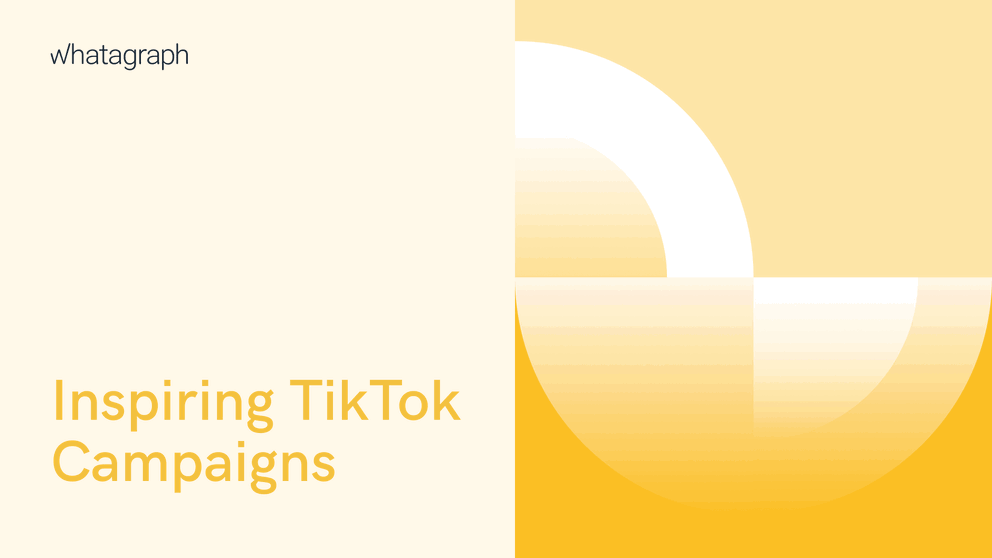
KPIs & metrics · 7 mins
15 Inspiring TikTok Campaigns: Success Stories To Learn From
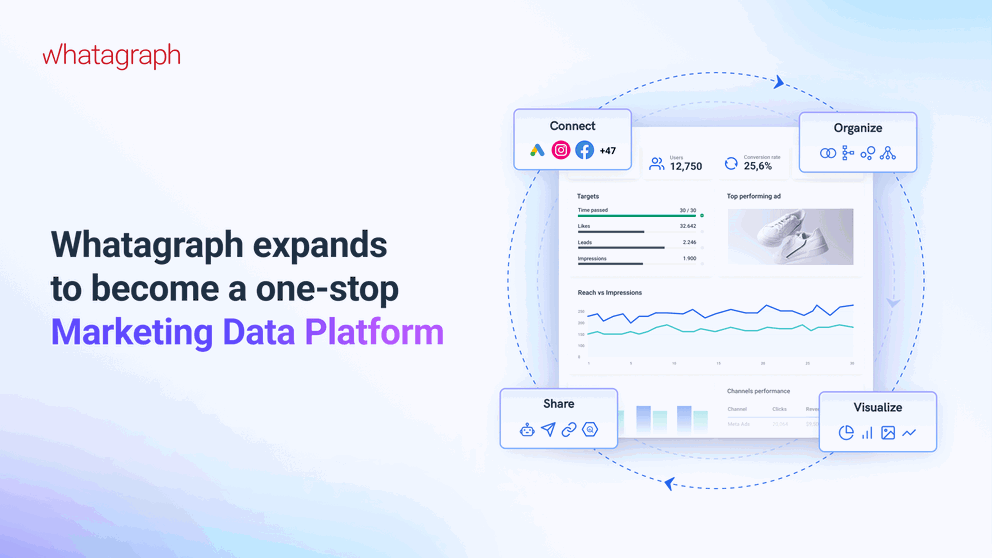
Product news · 2 mins
Whatagraph Expands to Become a One-Stop Marketing Data Platform
Get marketing insights direct to your inbox.
By submitting this form, you agree to our privacy policy
Top Streams
- Data Science Courses in USA
- Business Analytics Courses in USA
- Engineering Courses in USA
- Tax Courses in USA
- Healthcare Courses in USA
- Language Courses in USA
- Insurance Courses in USA
- Digital Marketing Courses in USA
Top Specialization
- Masters in Data Analytics in USA
- Masters in Mechanical Engineering in USA
- Masters in Supply Chain Management in USA
- Masters in Computer Science in USA
- MBA in Finance in USA
- Masters in Architecture in USA
Top Universities
- Cornell University
- Yale University
- Princeton University
- University of California Los Angeles
- University of Harvard
- Stanford University
- Arizona State University
- Northeastern University
ACCEL PROGRAMS
- Master of Business Administration
- MS in Data Analytics
- MS in Computer Science
- Project Management Courses in Australia
- Accounting Courses in Australia
- Medical Courses in Australia
- Psychology Courses in Australia
- Interior Designing Courses in Australia
- Pharmacy Courses in Australia
- Social Work Courses in Australia
- MBA in Australia
- Masters in Education in Australia
- Masters in Pharmacy in Australia
- Masters in Information Technology in Australia
- BBA in Australia
- Masters in Teaching in Australia
- Masters in Psychology in Australia
- University of Melbourne
- Deakin University
- Carnegie Mellon University
- Monash University
- University of Sydney
- University of Queensland
- RMIT University
- Macquarie University
- Bachelor of Business Administration
- Bachelor of Computer Applications
- Data Science Courses in Canada
- Business Management Courses in Canada
- Supply Chain Management Courses in Canada
- Project Management Courses in Canada
- Business Analytics Courses in Canada
- Hotel Management Courses in Canada
- MBA in Canada
- MS in Canada
- Masters in Computer Science in Canada
- Masters in Management in Canada
- Masters in Psychology in Canada
- Masters in Education in Canada
- MBA in Finance in Canada
- Masters in Business Analytics in Canada
- University of Toronto
- University of British Columbia
- McGill University
- University of Alberta
- York University
- University of Calgary
- Algoma University
- University Canada West
- BBA in Canada, Trinity Western University
- BBA in Canada, Yorkville University
- Project Management Courses in UK
- Data Science Courses in UK
- Public Health Courses in UK
- Digital Marketing Courses in UK
- Hotel Management Courses in UK
- Nursing Courses in UK
- Medicine Courses in UK
- Interior Designing Courses in UK
- Masters in Computer Science in UK
- Masters in Psychology in UK
- MBA in Finance in UK
- MBA in Healthcare Management in UK
- Masters in Education in UK
- Masters in Marketing in UK
- MBA in HR in UK
- University of Oxford
- University of Cambridge
- Coventry University
- University of East London
- University of Hertfordshire
- University of Birmingham
- Imperial College London
- University of Glasgow
- MBA with Work Placement
- MSc Data Science with Work Placement
Top Resources
- Universities in Germany
- Study in Germany
- Masters in Germany
- Courses in Germany
- Bachelors in Germany
- Germany Job Seeker Visa
- Cost of Living in Germany
- Best Universities in Germany
Top Courses
- Masters in Data Science in Germany
- MS in Computer Science in Germany
- Marine Engineering in Germany
- MS Courses in Germany
- Masters in Psychology in Germany
- Hotel Management Courses in Germany
- Masters in Economics in Germany
- Paramedical Courses in Germany
- Karlsruhe Institute of Technology
- University of Bonn
- University of Freiburg
- University of Hamburg
- University of Stuttgart
- Saarland University
- Mannheim University
- Master of Business Administration (90 ECTS)
- MS Data Science 60 ECTS
- Master in Computer Science (120 ECTS)
- MBA in Ireland
- Phd in Ireland
- Masters in Computer Science Ireland
- Cyber Security in Ireland
- Masters in Data Analytics Ireland
- Ms in Data Science in Ireland
- Pharmacy courses in ireland
- Business Analytics Course in Ireland
- Universities in Ireland
- Study in Ireland
- Masters in Ireland
- Courses in Ireland
- Bachelors in Ireland
- Cost of Living in Ireland
- Ireland Student Visa
- Part Time Jobs in Ireland
- Trinity College Dublin
- University College Dublin
- Dublin City University
- University of Limerick
- Dublin Business School
- Maynooth University
- University College Cork
- National College of Ireland
Colleges & Courses
- Masters in France
- Phd in France
- Study Medicine in France
- Best Universities in Frankfurt
- Best Architecture Colleges in France
- ESIGELEC France
- Study in France for Indian Students
- Intakes in France
- SOP for France Visa
- Study in France from India
- Reasons to Study in France
- How to Settle in France
More About France
- Cost of Living in France
- France Study Visa
- Cost of Living in Frankfurt
- France Scholarship for Indian Students
- Part Time Jobs in France
- Stay Back in France After Masters
About Finland
- Universities in Finland
- Study in Finland
- Courses in Finland
- Bachelor Courses in Finland
- Masters Courses in Finland
- Cost of Living in Finland
- MS in Finland
- Average Fees in Finland Universities
- PhD in Finland
- MBA Leading Business Transformation
- MBA Business Technologies
- Bachelor Degree in Medicine & Surgery
- MBBS Courses in Georgia
- MBBS Courses in Russia
- Alte University
- Caucasus University
- Georgian National University SEU
- David Tvildiani Medical University
- Caspian International School Of Medicine
- Asfendiyarov Kazakh National Medical University
- Kyrgyz State Medical Academy
- Cremeia Federal University
- Bashkir State Medical University
- Kursk State Medical University
- Andijan State Medical Institute
- IELTS Syllabus
- IELTS Prepration
- IELTS Eligibility
- IELTS Test Format
- IELTS Band Descriptors
- IELTS Speaking test
- IELTS Writing Task 1
- IELTS score validity
- IELTS Cue Card
IELTS Reading Answers Sample
- Animal Camouflage
- Types Of Societies
- Australia Convict Colonies
- A Spark A Flint
- Emigration To The Us
- The History Of Salt
- Zoo Conservation Programmes
- The Robots Are Coming
- The Development Of Plastic
IELTS Speaking Cue Card Sample
- Describe A Puzzle You Have Played
- Describe A Long Walk You Ever Had
- Describe Your Favourite Movie
- Describe A Difficult Thing You did
- Describe A Businessman You Admire
- Memorable Day in My Life
- Describe Your Dream House
- Describe A Bag You Want to Own
- Describe a Famous Athlete You Know
- Aquatic Animal
IELTS Essay Sample Sample
- Best Education System
- IELTS Opinion Essay
- Agree or Disagree Essay
- Problem Solution Essays
- Essay on Space Exploration
- Essay On Historical Places
- Essay Writing Samples
- Tourism Essay
- Global Warming Essay
- GRE Exam Fees
- GRE Exam Syllabus
- GRE Exam Eligibility
- Sections in GRE Exam
- GRE Exam Benefits
- GRE Exam Results
- GRE Cutoff for US Universities
- GRE Preparation
- Send GRE scores to Universities
GRE Exam Study Material
- GRE Verbal Preparation
- GRE Study Material
- GRE AWA Essays
- GRE Sample Issue Essays
- Stanford University GRE Cutoff
- Harvard University GRE Cutoff
- GRE Quantitative Reasoning
- GRE Verbal Reasoning
- GRE Reading Comprehension
- Prepare for GRE in 2 months
Other Resources
- Documents Required For Gre Exam
- GRE Exam Duration
- GRE at Home
- GRE vs GMAT
- Improve GRE Verbal Scores
Free GRE Ebooks
- GRE Preparation Guide (Free PDF)
- GRE Syllabus (Free PDF)
- GMAT Eligibility
- GMAT Syllabus
- GMAT Exam Dates
- GMAT Registration
- GMAT Exam Fees
- GMAT Sections
- GMAT Purpose
GMAT Exam Study Material
- How to prepare for GMAT?
- GMAT Score Validity
- GMAT Preparation Books
- GMAT Preparation
- GMAT Exam Duration
- GMAT Score for Harvard
- GMAT Reading Comprehension
- GMAT Retake Strategy
Free GMAT Ebooks
- GMAT Guide PDF
- Download GMAT Syllabus PDF
- TOEFL Exam Registration
- TOEFL Exam Eligibility
- TOEFL Exam Pattern
- TOEFL Exam Preparation
- TOEFL Exam Tips
- TOEFL Exam Dates
- Documents for TOEFL Exam
- TOEFL Exam Fee
TOEFL Exam Study Material
- TOEFL Preparation Books
- TOEFL Speaking Section
- TOEFL Score and Results
- TOEFL Writing Section
- TOEFL Reading Section
- TOEFL Listening Section
- TOEFL Vocabulary
- Types of Essays in TOEFL
Free TOEFL Ebooks
- TOEFL Exam Guide (Free PDF)
- PTE Exam Dates
- PTE Exam Syllabus
- PTE Exam Eligibility Criteria
- PTE Test Centers in India
- PTE Exam Pattern
- PTE Exam Fees
- PTE Exam Duration
- PTE Exam Registration
PTE Exam Study Material
- PTE Exam Preparation
- PTE Speaking Test
- PTE Reading Test
- PTE Listening Test
- PTE Writing Test
- PTE Essay Writing
- PTE exam for Australia
Free PTE Ebooks
- PTE Syllabus (Free PDF)
- Duolingo Exam
- Duolingo Test Eligibility
- Duolingo Exam Pattern
- Duolingo Exam Fees
- Duolingo Test Validity
- Duolingo Syllabus
- Duolingo Preparation
Duolingo Exam Study Material
- Duolingo Exam Dates
- Duolingo Test Score
- Duolingo Test Results
- Duolingo Test Booking
Free Duolingo Ebooks
- Duolingo Guide (Free PDF)
- Duolingo Test Pattern (Free PDF)
NEET & MCAT Exam
- NEET Study Material
- NEET Preparation
- MCAT Eligibility
- MCAT Preparation
SAT & ACT Exam
- ACT Eligibility
- ACT Exam Dates
- SAT Syllabus
- SAT Exam Pattern
- SAT Exam Eligibility
USMLE & OET Exam
- USMLE Syllabus
- USMLE Preparation
- USMLE Step 1
- OET Syllabus
- OET Eligibility
- OET Prepration
PLAB & LSAT Exam
- PLAB Exam Syllabus
- PLAB Exam Fees
- LSAT Eligibility
- LSAT Registration
- TOEIC Result
- Study Guide
Application Process
- LOR for Masters
- SOP Samples for MS
- LOR for Phd
- SOP for Internship
- SOP for Phd
- Check Visa Status
- Motivation Letter Format
- Motivation Letter for Internship
- F1 Visa Documents Checklist
Career Prospects
- Popular Courses after Bcom in Abroad
- Part Time Jobs in Australia
- Part Time Jobs in USA
- Salary after MS in Germany
- Salary after MBA in Canada
- Average Salary in Singapore
- Higher Studies after MBA in Abroad
- Study in Canada after 12th
Trending Topics
- Best Education System in World
- Best Flying Schools in World
- Top Free Education Countries
- Best Countries to Migrate from India
- 1 Year PG Diploma Courses in Canada
- Canada Vs India
- Germany Post Study Work Visa
- Post Study Visa in USA
- Data Science Vs Data Analytics
- Public Vs Private Universities in Germany
- Universities Vs Colleges
- Difference Between GPA and CGPA
- Undergraduate Vs Graduate
- MBA in UK Vs MBA in USA
- Degree Vs Diploma in Canada
- IELTS vs TOEFL
- Duolingo English Test vs. IELTS
- Why Study in Canada
- Cost of Living in Canada
- Education System in Canada
- SOP for Canada
- Summer Intake in Canada
- Spring Intake in Canada
- Winter Intake in Canada
- Accommodation in Canada for Students
- Average Salary in Canada
- Fully Funded Scholarships in Canada
- Why Study in USA
- Cost of Studying in USA
- Spring Intake in USA
- Winter Intake in USA
- Summer Intake in USA
- STEM Courses in USA
- Scholarships for MS in USA
- Acceptable Study Gap in USA
- Interesting Facts about USA
- Free USA course
- Why Study in UK
- Cost of Living in UK
- Cost of Studying in UK
- Education System in UK
- Summer Intake in UK
- Spring Intake in UK
- Student Visa for UK
- Accommodation in UK for Students
- Scholarships in UK
- Why Study in Germany
- Cost of Studying in Germany
- Education System in Germany
- SOP for Germany
- Summer Intake in Germany
- Winter Intake in Germany
- Study Visa for Germany
- Accommodation in Germany for Students
- Free Education in Germany
Country Guides
- Study in UK
- Study in Canada
- Study in USA
- Study in Australia
- SOP Samples for Canada Student Visa
- US F1 Visa Guide for Aspirants
Exams Guides
- Duolingo Test Pattern
Recommended Reads
- Fully Funded Masters Guide
- SOP Samples For Australia
- Scholarships for Canada
- Data Science Guide
- SOP for MS in Computer Science
- Study Abroad Exams
- Alumni Connect
- Booster Program
GPA CALCULATOR Convert percentage marks to GPA effortlessly with our calculator!
Expense calculator plan your study abroad expenses with our comprehensive calculator, ielts band calculator estimate your ielts band score with our accurate calculator, education loan calculator discover your eligible loan amount limit with our education calculator, university partner explore growth and opportunities with our university partnership, accommodation discover your perfect study abroad accommodation here, experience-center discover our offline centers for a personalized experience, our offices visit us for expert study abroad counseling..
- 18002102030
- Study Abroad
Social Media Advantages and Disadvantages IELTS Essay
- IELTS Preparation
- IELTS E-Books
- IELTS Registration
- IELTS Exam Fee
- IELTS Exam Dates 2024
- Documents Required
- IELTS Test Centers
- Test Format
- Band Descriptors
- IELTS Speaking Test
- General Reading Test
- General Writing Task
- IELTS Coaching
- Types of Essays
- IELTS for Australia
- IELTS Results
- Generation Gap Essay
- GPA Calculator
- Study Abroad Consultant In India
- Study Visa Consultants in India
Updated on 26 February, 2024

Akansha Semwal
Study abroad expert.
If you are planning to move outside the country for higher education, better career prospects, and PR, then taking the IELTS exam is necessary. The test is aimed at checking the English language proficiency of a candidate through four different sections, Listening, Reading, Writing, and Speaking. Here are samples of an essay from the writing section on the topic ‘Social Media Advantages and Disadvantages’.
Table of Contents
Essay 1 on advantages and disadvantages of social media, essay 2 on social media advantages and disadvantages, download e-books for ielts preparation, more resources to read about essays:, frequently asked questions.
This generation's language is undoubtedly social media – we all live and breathe our online presence, and these social platforms are its foundation. With multiple social media channels such as YouTube, Facebook, Instagram, Twitter, WhatsApp, and Snapchat in the running, there is no end to what social media can do. However, this statement holds for both positive and negative effects of the medium.
Social Media definitely has a positive side as well for the people using it. One of the most significant advantages, or probably the reason why the concept was created, was to communicate. Social media helps us contact/stay in touch with people we love, celebrities who we admire, or connect with new individuals. Another advantage of social media is that it can be used as a powerful tool to educate others. Nowadays, every piece of information or detail you may need is a click away, and social media promotes the same availability of knowledge. Additionally, you can use social media as a tool to market your brand or company as the platforms are quickly turning into a massive hub for advertisements.
With these advantages, social media also poses many cons/disadvantages. Despite it being the perfect medium for sharing information – your moods and whereabouts to people–you are also susceptible to privacy issues and hackers. Many social media users also face the ill effects of these platforms through cyberbullying, which leads to mental health issues and even greater cases of suicides in the present generation. Furthermore, various reports also entail that overusing social media can even hamper students' academic performance since they waste their precious time on these applications.
Thus, these set of advantages and disadvantages together highlight it is best to use social media in moderation and avail its benefits in a balanced manner.
Word Count: 296
Recommended Reads:
Download IELTS Preparation Guide For Free
Get to know about the latest updates on the IELTS Exam, Eligibility, Preparation Tips, Test procedure, Exam Pattern, Syllabus, Registration Process, Important Exam Dates, and much more!! This guide is a one-stop solution for every IELTS Aspirant who aims to crack the exam with an impressive band score.
Yes, social media has many advantages and disadvantages in the present world. Even though social media was created for the betterment of the social relationships in the world, it is the cause of many people ruining their health and others. The best way to deal with social media is to understand its pros and cons and look at your relationship with these applications.
Talking about the positives of using social media, it is the best way to get the latest updates and news about the world. Whether it is about entertainment, politics, or economics, you can get all types of news through social media. If you spend your time on appropriate accounts and platforms, you will also be able to gain knowledge on several topics. The best part of using social media is that you can enjoy the ability to connect with people remotely even if you can't meet them. This was a big benefit in the pandemic era.
Social media has also become a home for fake ids and anonymous accounts that spread hate and negativity. People also hack into other people's accounts, which can cause loss of personal data and identity thefts. Not just that, social media has also lowered human interactions and changed the way we perceive modern human relations. What was thought to be a great way to connect with others has left people lonely and sad.
Social media is both a curse and a boon depending on your use. If you are vigilant enough to maintain a balance, these social media channels should not cause many problems and negative impacts. All in all, it is all about keeping usage in moderation and having a life beyond social media.
Word Count: 283

Important IELTS Exam Resources
Ielts exam overview.
IELTS is required to be taken by international students and workers who wish to study or work in a country where English is the primary language of communication. Know the complete details.
IELTS Exam Syllabus
With the right knowledge of the IELTS exam syllabus and pattern, cracking the popular English test won’t be difficult.
- IELTS Exam Pattern
The IELTS exam pattern encompasses four major sections, i.e. listening, speaking, writing, and reading.
Register For IELTS
IELTS is the most popular and crucial test for evaluating English language proficiency throughout the world. Learn how to register for the IELTS exam.
IELTS Exam Eligibility Criteria
It becomes necessary for candidates to meet the eligibility for IELTS exam and demonstrate their language proficiency while being assessed on four parameters, namely, Writing, Reading, Speaking and Listening.
IELTS Exam Fees
The IELTS exam fee in India varies based on the types of IELTS tests. The link below shows detailed information on the IELTS exam fees.
IELTS Exam Dates 2022
The IELTS exam dates are allotted on a first-come and first-serve basis. Choose your date and timings beforehand to avoid the delay. You can register for the test both in online and offline mode.
IELTS Test Centres in India
Fully aware of the growing popularity of the language test, we bring to you a list of IELTS exam centers in India. The list will enable aspirants in better planning before registering for the test.
Band Score for Reading
IELTS reading band score decides the knowledge and proficiency of the English language of the applicants.

IELTS Listening Band Score
The listening section evaluates the comprehension level of candidates. The scores also depend on the understanding of different accents and dialects.
IELTS Score Validity
The IELTS score validity for General and Academic is two years across the globe. The IELTS result validity for Canada is two years.
- Types of IELTS Exam
There are two types of IELTS tests – i) Academic IELTS and ii) General Training IELTS. Candidates are often confused about making the right choice of IELTS test that can meet their requirements regarding their education or job.
Books for IELTS Preparation
Picking the best IELTS books for preparation is essential for scoring well. It may seem tough at first but cracking the examination successfully is not impossible.
IELTS Writing Task 2 Topics
Writing task 2 in IELTS is descriptive essay writing. The applicants are supposed to write an essay in response to the statement or situation given in the essay.
Tips for IELTS Writing
Before appearing for the test, let’s take a look at the below-mentioned IELTS writing tips and tricks to score well in the writing section.
Reading Section IELTS
Reading is the second part of the IELTS test and takes 60 minutes. It consists of three or sometimes four reading passages to increase difficulty, and there are a total of 40 questions to answer.
IELTS Speaking Preparation
Please note that your performance on the speaking test is assessed based on the following criteria- fluency and coherence, grammatical range and accuracy, lexical resource, and pronunciation.
Phrases for IELTS Speaking
There are many phrases for IELTS speaking that a candidate should practice beforehand. If you aim for band 9, you should know these phrases.
- IELTS Band Score Chart
IELTS is one of the most used English Language Proficiency Tests. The exam is scored in bands. Your IELTS band score determines the performance level of your test.
- IELTS Band Score
Understanding the IELTS band score is not difficult. The results of the examination are reported on a scale of 9 bands.
- IELTS Slot Booking
To book the IELTS exam, the candidates can either visit their nearest test center or book the slot online by visiting the official website of IDP. If they choose to go with the second option, they should follow the steps given below.
IELTS Academic Writing Task 1
IELTS Academic writing is meant for students who are applying for top-ranked universities and colleges in English-speaking countries. The writing task one is an academic summary writing based on diagrammatic and graphical representation.
- IELTS Writing Task 2
Writing Task 2 is the second part of the writing section of IELTS, where aspirants are presented with a point of view, argument, or problem and asked to write an essay in response to the question.
Writing Task 1 IELTS
In IELTS Academic Writing Task 1 starts with a diagram, a visual representation of information. It can be a table, map, graph, process, diagram, or picture.
IELTS Essay Samples
The essay for IELTS is part of Writing Task 2. It is the same for the General Training and Academic of the IELTS. You will get a topic and have to write an essay on the same.
IELTS Cue Cards
The IELTS speaking cue cards come into play for the second part when the candidate will be choosing cue cards and then speaking on a topic for two minutes at least.
Difference between Online and Offline Classes
Crop Growing Skyscrapers Reading Answers
Essay on Coronavirus 150 Words
Disadvantages of A Nuclear Family
How To Face Problems In Life
Paragraph On Digital India
Telecommuting Has Many Advantages And the Following Drawbacks
Advantages of Plastic Containers
Honesty is the Best Policy Essay
Theme of the poem ‘The Road Not Taken’
Essay On Generation Gap
What are the advantages of using social media?
The most significant advantage of using social media is global connectivity. The online networks have allowed users to connect and communicate with family, friends, acquaintances, etc. instantly. In today's world, it has also become an important tool for business expansion, social awareness, recruitment, and shopping.
What is advantage and disadvantage essay in IELTS?
The IELTS advantage and disadvantage essays require you to convey positive and negative sides of the given subject while providing a balanced argument. You must ensure not to skip any of the sides, i.e., you should not focus on solely exhibiting the advantages or disadvantages. Also, remember to conclude your essay with a judgement.
What are different types of IELTS essay?
You can expect the following types of essay in IELTS Writing task:
- Opinion essays
- Discussion essays
- Advantage/disadvantage essays
- Multi-part essay
- Multi-part and opinion essay
- Cause/solution essay
Akansha Semwal is a content marketer at upGrad and has also worked as a social media marketer & sub-editor. Experienced in creating impressive Statement of Purpose, Essays, and LOR, she knows how to captivate the attention of Admissions Committee. Her research-driven;study-abroad articles helps aspirants to make the prudent decision. She holds a bachelor's & master's degree in Literature from the University of Delhi.
Important Exams
Important ielts essay resources, get free consultation for ielts, trending searches, university ranking, university acceptance rate.
- Uts Ranking In Australia
- Adelphi University Ranking
- Illinois Institute Of Technology World Ranking
- Webster University Ranking
- St Louis University Ranking
- Saint Peter'S University Ranking
- Ranking Of York St John University
- Clark University Ranking
- University Of Dayton Qs Ranking
- Purdue University World Ranking
- Srh Berlin Ranking
- University Of West London World Ranking
- University Of Illinois Springfield Qs Ranking
- University Of Prince Edward Island Ranking
- University Of Kansas Qs Ranking
- Nyit Ranking
- University Of Queensland Acceptance Rate
- University Of Technology Sydney Acceptance Rate
- Lewis University Visa Acceptance Rate
- Ontario Tech University Acceptance Rate
- Sacred Heart University Visa Acceptance Rate
- Swinburne University Acceptance Rate
- University Of Kent Acceptance Rate
- Trent University Acceptance Rate
- University Of Freiburg Acceptance Rate
- University Of Cologne Acceptance Rate
- Tu Darmstadt Acceptance Rate
- IELTS Reading Band Score
- Tips to Crack IELTS in First Attempt
- Titan Of Technology
- The Scientific Method
- Space Travel & Health
- IELTS Important Vocabulary
- IELTs Academic Writing
- How to Be Confident While Speaking
- Study in USA without IELTS
- IELTS Line Graph
- Nature & Nurture
- Light Pollution
- IELTS Speaking Topics
- Alzheimers Disease
- Global Warming
- Literacy In Freedonia's Prisons
- Emigration To The US
- Flooding And Its Impact
- Rapid Police Response
- Honey Bees in Trouble
- Making Time for science
- Amateur Naturalists
- Science In Space
- IELTS Band Description
The above tips are the Author's experiences. upGrad does not guarantee scores or admissions.
Call us to clear your doubts at:
Download our App
- Grievance Redressal
- Experience Centers
- Terms of Use
- Privacy Policy
- University Partner
- Accommodation
- IELTS Band Calculator
- Download Study Abroad App
- Education Loan Calculator
- upGrad Abroad Office
- Expense Calculator
- Knowledge Base
Top Destinations
Masters programs.
- MBA in Germany, IU
- MIM in Germany, IU
- MS in CS in Germany, IU
- MS in Data Analytics in USA, Clark University
- MS in Project Management in USA, Clark University
- MS in IT in USA, Clark University
- MS in Data Analytics & Visualization in USA, Yeshiva University
- MS in Artificial Intelligence in USA, Yeshiva University
- MS in Cybersecurity, Yeshiva University
Study Abroad Important Blogs
- Cost of Study:
- Cost of Studying in Canada
- Cost of Studying in Ireland
- Cost of Studying in Australia
- Cost of living:
- Cost of living in UK
- Cost of living in Australia
- Cost of living in Germany
- Cost of living in Ireland
- Cost of living in Canada
- Career Opportunities:
- Career Opportunities in Australia
- Career Opportunities in Germany
- Job Opportunities in After MS in Canada
- Job Opportunities After MBA in Australia
- Job Opportunities After MS in UK
- IELTS Exam Resources:
- Academic IELTS
- IELTS Score for UK
- IELTS Score for USA
- Validity of IELTS Score
- IELTS Reading Tips
- How to Prepare for IELTS at Home Without Coaching
- IELTS Preparation Books
- IELTS Academic vs General
- IELTS Essay
- IELTS Exam Dates
- Top Streams:
- Fashion Designing Courses in Australia
- Accounting Courses in Canada
- Management Courses in Canada
Feb 15, 2023
6 Example Essays on Social Media | Advantages, Effects, and Outlines
Got an essay assignment about the effects of social media we got you covered check out our examples and outlines below.
Social media has become one of our society's most prominent ways of communication and information sharing in a very short time. It has changed how we communicate and has given us a platform to express our views and opinions and connect with others. It keeps us informed about the world around us. Social media platforms such as Facebook, Twitter, Instagram, and LinkedIn have brought individuals from all over the world together, breaking down geographical borders and fostering a genuinely global community.
However, social media comes with its difficulties. With the rise of misinformation, cyberbullying, and privacy problems, it's critical to utilize these platforms properly and be aware of the risks. Students in the academic world are frequently assigned essays about the impact of social media on numerous elements of our lives, such as relationships, politics, and culture. These essays necessitate a thorough comprehension of the subject matter, critical thinking, and the ability to synthesize and convey information clearly and succinctly.
But where do you begin? It can be challenging to know where to start with so much information available. Jenni.ai comes in handy here. Jenni.ai is an AI application built exclusively for students to help them write essays more quickly and easily. Jenni.ai provides students with inspiration and assistance on how to approach their essays with its enormous database of sample essays on a variety of themes, including social media. Jenni.ai is the solution you've been looking for if you're experiencing writer's block or need assistance getting started.
So, whether you're a student looking to better your essay writing skills or want to remain up to date on the latest social media advancements, Jenni.ai is here to help. Jenni.ai is the ideal tool for helping you write your finest essay ever, thanks to its simple design, an extensive database of example essays, and cutting-edge AI technology. So, why delay? Sign up for a free trial of Jenni.ai today and begin exploring the worlds of social networking and essay writing!
Want to learn how to write an argumentative essay? Check out these inspiring examples!
We will provide various examples of social media essays so you may get a feel for the genre.
6 Examples of Social Media Essays
Here are 6 examples of Social Media Essays:
The Impact of Social Media on Relationships and Communication
Introduction:.
The way we share information and build relationships has evolved as a direct result of the prevalence of social media in our daily lives. The influence of social media on interpersonal connections and conversation is a hot topic. Although social media has many positive effects, such as bringing people together regardless of physical proximity and making communication quicker and more accessible, it also has a dark side that can affect interpersonal connections and dialogue.
Positive Effects:
Connecting People Across Distances
One of social media's most significant benefits is its ability to connect individuals across long distances. People can use social media platforms to interact and stay in touch with friends and family far away. People can now maintain intimate relationships with those they care about, even when physically separated.
Improved Communication Speed and Efficiency
Additionally, the proliferation of social media sites has accelerated and simplified communication. Thanks to instant messaging, users can have short, timely conversations rather than lengthy ones via email. Furthermore, social media facilitates group communication, such as with classmates or employees, by providing a unified forum for such activities.
Negative Effects:
Decreased Face-to-Face Communication
The decline in in-person interaction is one of social media's most pernicious consequences on interpersonal connections and dialogue. People's reliance on digital communication over in-person contact has increased along with the popularity of social media. Face-to-face interaction has suffered as a result, which has adverse effects on interpersonal relationships and the development of social skills.
Decreased Emotional Intimacy
Another adverse effect of social media on relationships and communication is decreased emotional intimacy. Digital communication lacks the nonverbal cues and facial expressions critical in building emotional connections with others. This can make it more difficult for people to develop close and meaningful relationships, leading to increased loneliness and isolation.
Increased Conflict and Miscommunication
Finally, social media can also lead to increased conflict and miscommunication. The anonymity and distance provided by digital communication can lead to misunderstandings and hurtful comments that might not have been made face-to-face. Additionally, social media can provide a platform for cyberbullying , which can have severe consequences for the victim's mental health and well-being.
Conclusion:
In conclusion, the impact of social media on relationships and communication is a complex issue with both positive and negative effects. While social media platforms offer many benefits, such as connecting people across distances and enabling faster and more accessible communication, they also have a dark side that can negatively affect relationships and communication. It is up to individuals to use social media responsibly and to prioritize in-person communication in their relationships and interactions with others.
The Role of Social Media in the Spread of Misinformation and Fake News
Social media has revolutionized the way information is shared and disseminated. However, the ease and speed at which data can be spread on social media also make it a powerful tool for spreading misinformation and fake news. Misinformation and fake news can seriously affect public opinion, influence political decisions, and even cause harm to individuals and communities.
The Pervasiveness of Misinformation and Fake News on Social Media
Misinformation and fake news are prevalent on social media platforms, where they can spread quickly and reach a large audience. This is partly due to the way social media algorithms work, which prioritizes content likely to generate engagement, such as sensational or controversial stories. As a result, false information can spread rapidly and be widely shared before it is fact-checked or debunked.
The Influence of Social Media on Public Opinion
Social media can significantly impact public opinion, as people are likelier to believe the information they see shared by their friends and followers. This can lead to a self-reinforcing cycle, where misinformation and fake news are spread and reinforced, even in the face of evidence to the contrary.
The Challenge of Correcting Misinformation and Fake News
Correcting misinformation and fake news on social media can be a challenging task. This is partly due to the speed at which false information can spread and the difficulty of reaching the same audience exposed to the wrong information in the first place. Additionally, some individuals may be resistant to accepting correction, primarily if the incorrect information supports their beliefs or biases.
In conclusion, the function of social media in disseminating misinformation and fake news is complex and urgent. While social media has revolutionized the sharing of information, it has also made it simpler for false information to propagate and be widely believed. Individuals must be accountable for the information they share and consume, and social media firms must take measures to prevent the spread of disinformation and fake news on their platforms.
The Effects of Social Media on Mental Health and Well-Being
Social media has become an integral part of modern life, with billions of people around the world using platforms like Facebook, Instagram, and Twitter to stay connected with others and access information. However, while social media has many benefits, it can also negatively affect mental health and well-being.
Comparison and Low Self-Esteem
One of the key ways that social media can affect mental health is by promoting feelings of comparison and low self-esteem. People often present a curated version of their lives on social media, highlighting their successes and hiding their struggles. This can lead others to compare themselves unfavorably, leading to feelings of inadequacy and low self-esteem.
Cyberbullying and Online Harassment
Another way that social media can negatively impact mental health is through cyberbullying and online harassment. Social media provides a platform for anonymous individuals to harass and abuse others, leading to feelings of anxiety, fear, and depression.
Social Isolation
Despite its name, social media can also contribute to feelings of isolation. At the same time, people may have many online friends but need more meaningful in-person connections and support. This can lead to feelings of loneliness and depression.
Addiction and Overuse
Finally, social media can be addictive, leading to overuse and negatively impacting mental health and well-being. People may spend hours each day scrolling through their feeds, neglecting other important areas of their lives, such as work, family, and self-care.
In sum, social media has positive and negative consequences on one's psychological and emotional well-being. Realizing this, and taking measures like reducing one's social media use, reaching out to loved ones for help, and prioritizing one's well-being, are crucial. In addition, it's vital that social media giants take ownership of their platforms and actively encourage excellent mental health and well-being.
The Use of Social Media in Political Activism and Social Movements
Social media has recently become increasingly crucial in political action and social movements. Platforms such as Twitter, Facebook, and Instagram have given people new ways to express themselves, organize protests, and raise awareness about social and political issues.
Raising Awareness and Mobilizing Action
One of the most important uses of social media in political activity and social movements has been to raise awareness about important issues and mobilize action. Hashtags such as #MeToo and #BlackLivesMatter, for example, have brought attention to sexual harassment and racial injustice, respectively. Similarly, social media has been used to organize protests and other political actions, allowing people to band together and express themselves on a bigger scale.
Connecting with like-minded individuals
A second method in that social media has been utilized in political activity and social movements is to unite like-minded individuals. Through social media, individuals can join online groups, share knowledge and resources, and work with others to accomplish shared objectives. This has been especially significant for geographically scattered individuals or those without access to traditional means of political organizing.
Challenges and Limitations
As a vehicle for political action and social movements, social media has faced many obstacles and restrictions despite its many advantages. For instance, the propagation of misinformation and fake news on social media can impede attempts to disseminate accurate and reliable information. In addition, social media corporations have been condemned for censorship and insufficient protection of user rights.
In conclusion, social media has emerged as a potent instrument for political activism and social movements, giving voice to previously unheard communities and galvanizing support for change. Social media presents many opportunities for communication and collaboration. Still, users and institutions must be conscious of the risks and limitations of these tools to promote their responsible and productive usage.
The Potential Privacy Concerns Raised by Social Media Use and Data Collection Practices
With billions of users each day on sites like Facebook, Twitter, and Instagram, social media has ingrained itself into every aspect of our lives. While these platforms offer a straightforward method to communicate with others and exchange information, they also raise significant concerns over data collecting and privacy. This article will examine the possible privacy issues posed by social media use and data-gathering techniques.
Data Collection and Sharing
The gathering and sharing of personal data are significant privacy issues brought up by social media use. Social networking sites gather user data, including details about their relationships, hobbies, and routines. This information is made available to third-party businesses for various uses, such as marketing and advertising. This can lead to serious concerns about who has access to and uses our personal information.
Lack of Control Over Personal Information
The absence of user control over personal information is a significant privacy issue brought up by social media usage. Social media makes it challenging to limit who has access to and how data is utilized once it has been posted. Sensitive information may end up being extensively disseminated and may be used maliciously as a result.
Personalized Marketing
Social media companies utilize the information they gather about users to target them with adverts relevant to their interests and usage patterns. Although this could be useful, it might also cause consumers to worry about their privacy since they might feel that their personal information is being used without their permission. Furthermore, there are issues with the integrity of the data being used to target users and the possibility of prejudice based on individual traits.
Government Surveillance
Using social media might spark worries about government surveillance. There are significant concerns regarding privacy and free expression when governments in some nations utilize social media platforms to follow and monitor residents.
In conclusion, social media use raises significant concerns regarding data collecting and privacy. While these platforms make it easy to interact with people and exchange information, they also gather a lot of personal information, which raises questions about who may access it and how it will be used. Users should be aware of these privacy issues and take precautions to safeguard their personal information, such as exercising caution when choosing what details to disclose on social media and keeping their information sharing with other firms to a minimum.
The Ethical and Privacy Concerns Surrounding Social Media Use And Data Collection
Our use of social media to communicate with loved ones, acquire information, and even conduct business has become a crucial part of our everyday lives. The extensive use of social media does, however, raise some ethical and privacy issues that must be resolved. The influence of social media use and data collecting on user rights, the accountability of social media businesses, and the need for improved regulation are all topics that will be covered in this article.
Effect on Individual Privacy:
Social networking sites gather tons of personal data from their users, including delicate information like search history, location data, and even health data. Each user's detailed profile may be created with this data and sold to advertising or used for other reasons. Concerns regarding the privacy of personal information might arise because social media businesses can use this data to target users with customized adverts.
Additionally, individuals might need to know how much their personal information is being gathered and exploited. Data breaches or the unauthorized sharing of personal information with other parties may result in instances where sensitive information is exposed. Users should be aware of the privacy rules of social media firms and take precautions to secure their data.
Responsibility of Social Media Companies:
Social media firms should ensure that they responsibly and ethically gather and use user information. This entails establishing strong security measures to safeguard sensitive information and ensuring users are informed of what information is being collected and how it is used.
Many social media businesses, nevertheless, have come under fire for not upholding these obligations. For instance, the Cambridge Analytica incident highlighted how Facebook users' personal information was exploited for political objectives without their knowledge. This demonstrates the necessity of social media corporations being held responsible for their deeds and ensuring that they are safeguarding the security and privacy of their users.
Better Regulation Is Needed
There is a need for tighter regulation in this field, given the effect, social media has on individual privacy as well as the obligations of social media firms. The creation of laws and regulations that ensure social media companies are gathering and using user information ethically and responsibly, as well as making sure users are aware of their rights and have the ability to control the information that is being collected about them, are all part of this.
Additionally, legislation should ensure that social media businesses are held responsible for their behavior, for example, by levying fines for data breaches or the unauthorized use of personal data. This will provide social media businesses with a significant incentive to prioritize their users' privacy and security and ensure they are upholding their obligations.
In conclusion, social media has fundamentally changed how we engage and communicate with one another, but this increased convenience also raises several ethical and privacy issues. Essential concerns that need to be addressed include the effect of social media on individual privacy, the accountability of social media businesses, and the requirement for greater regulation to safeguard user rights. We can make everyone's online experience safer and more secure by looking more closely at these issues.
In conclusion, social media is a complex and multifaceted topic that has recently captured the world's attention. With its ever-growing influence on our lives, it's no surprise that it has become a popular subject for students to explore in their writing. Whether you are writing an argumentative essay on the impact of social media on privacy, a persuasive essay on the role of social media in politics, or a descriptive essay on the changes social media has brought to the way we communicate, there are countless angles to approach this subject.
However, writing a comprehensive and well-researched essay on social media can be daunting. It requires a thorough understanding of the topic and the ability to articulate your ideas clearly and concisely. This is where Jenni.ai comes in. Our AI-powered tool is designed to help students like you save time and energy and focus on what truly matters - your education. With Jenni.ai , you'll have access to a wealth of examples and receive personalized writing suggestions and feedback.
Whether you're a student who's just starting your writing journey or looking to perfect your craft, Jenni.ai has everything you need to succeed. Our tool provides you with the necessary resources to write with confidence and clarity, no matter your experience level. You'll be able to experiment with different styles, explore new ideas , and refine your writing skills.
So why waste your time and energy struggling to write an essay on your own when you can have Jenni.ai by your side? Sign up for our free trial today and experience the difference for yourself! With Jenni.ai, you'll have the resources you need to write confidently, clearly, and creatively. Get started today and see just how easy and efficient writing can be!
Try Jenni for free today
Create your first piece of content with Jenni today and never look back

- Essay on Social Media: Top 5 pros and cons of social media

Apply as a tutor to teach students online from anywhere in the world.
Essay on social media: top 5 pros and cons of social media.
- Chloe Daniel
- Published On: June 24 ,2021
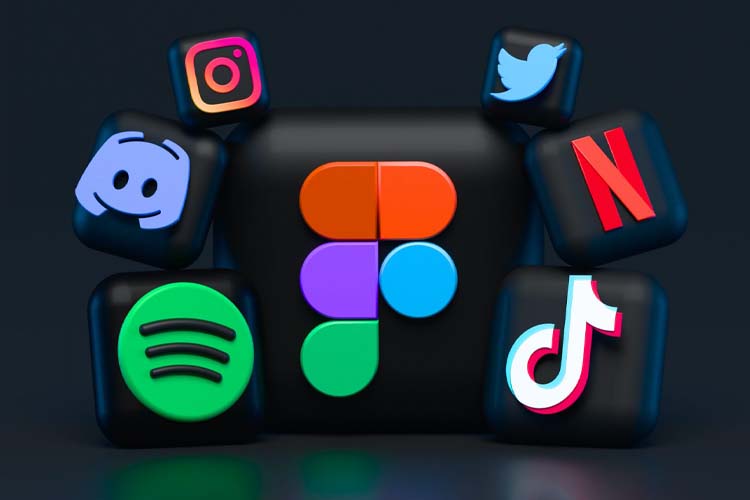
Pros of Social Media:
1. communication/connectivity:, 2. education:, 3. awareness:, 4. information and updates:, 5. business promotions:, cons of social media:, 1. cyberbullying:, 2. hacking:, 3. health issues:, 4. addiction:, 5. time consuming:, find top tutors in your area.

LATEST POST

- How Can Students Deal With Exam Stress?
March 21 ,2024
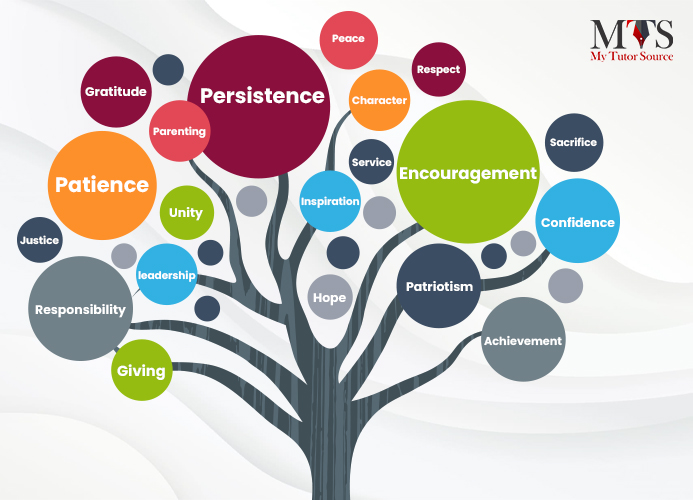
- The Importance of Moral Education For Students
March 19 ,2024

- How to Develop and Sharpen Your Mathematical Skills?
March 08 ,2024
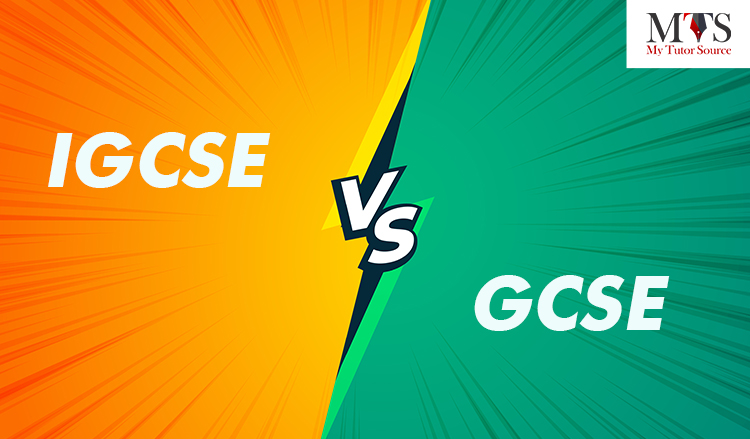
- IGCSE vs GCSE Critical Facts & Guidance for Students

- English Greetings for English Learners
December 14 ,2023

- Find the Best Way to Learn English | 12 Amazing Ways
December 13 ,2023
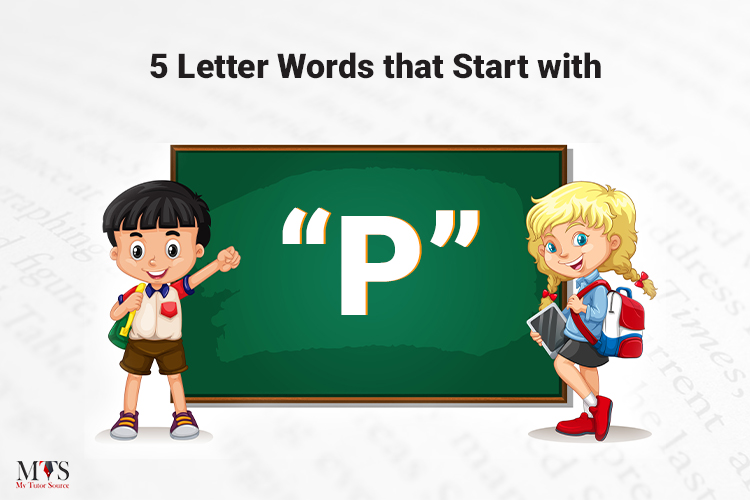
- List of 5-Letter Words Starting with “P”
May 12 ,2023
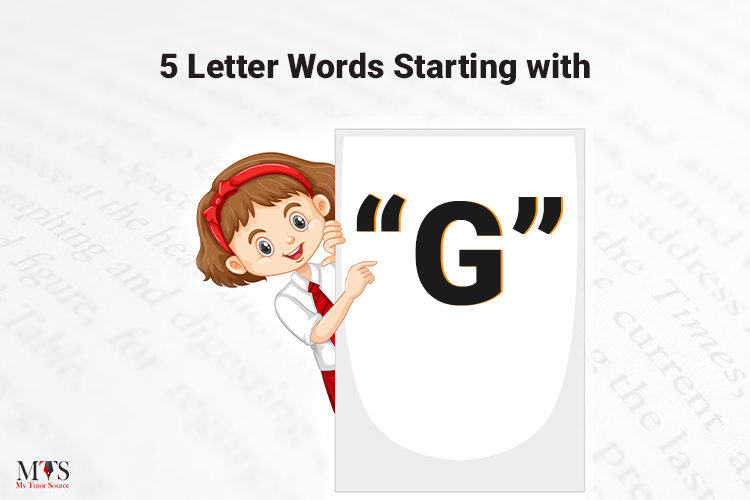
- 5-letter words starting with G - Every Student Should Know!
April 03 ,2023
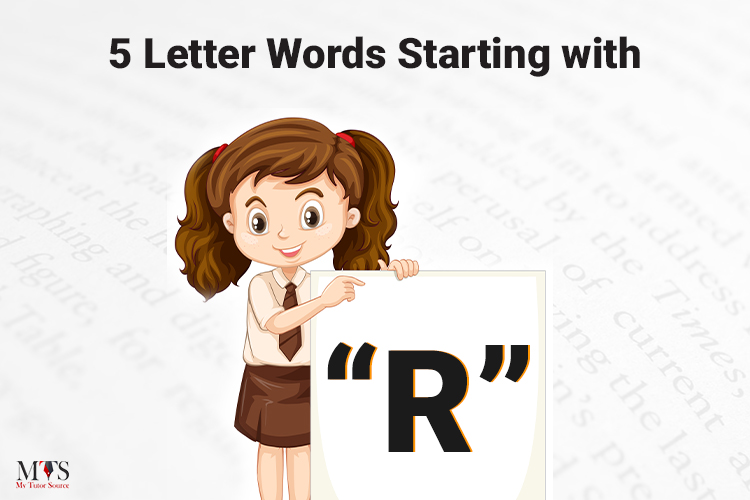
- Fill Your Vocabulary List with These Amazing 5-Letter R-Words!
March 13 ,2023
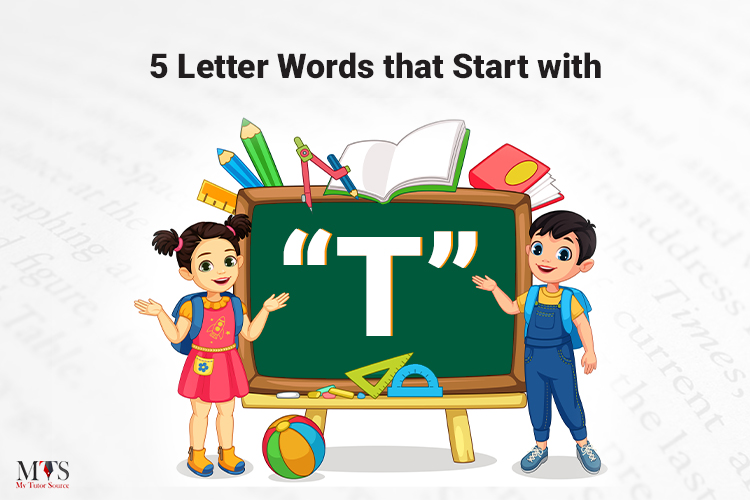
- The Ultimate List of 5-letter Words Starting with “T”
February 20 ,2023
Recent post.
- Teaching & learning
- Communication
Offer Ends in
Hire an Expert Tutor in Just $9.8/hr
Form Submitted Successfully
No, I Don't Want to Avail This Offer
- Essay Guides
- Other Essays
What Is a Social Media Essay – The Main Aspects and Points
- Speech Topics
- Basics of Essay Writing
- Essay Topics
- Main Academic Essays
- Research Paper Topics
- Basics of Research Paper Writing
- Miscellaneous
- Chicago/ Turabian
- Data & Statistics
- Methodology
- Admission Writing Tips
- Admission Advice
- Other Guides
- Student Life
- Studying Tips
- Understanding Plagiarism
- Academic Writing Tips
- Basics of Dissertation & Thesis Writing
- Research Paper Guides
- Formatting Guides
- Basics of Research Process
- Admission Guides
- Dissertation & Thesis Guides

Table of contents
Use our free Readability checker
The contemporary world is overloaded with various information. Its impact on humans is huge and can be either positive or negative. There are many informative online sites which allow communication thanks to comments, picture sharing, dialoguing, and even the statistics of likes and dislikes shows people’s attitude towards many things. Social media essay usually can touch upon advantages and disadvantages of things. For example, using of the Internet for communication and information exchange. Today people use social media not only for personal communication and to share some information but also for business and propaganda. The communications network plays a great role in a person’s self-development and self-realization. Networking helps people improve communicative skills and have abilities to solve a great number of life problems. The most popular services are:
- Facebook (more than 2 billion users)
- WhatsApp, YouTube, and Messenger in Facebook (more than 1 billion users)
- QZone, QQ, WeChat, and Instagram (more than 500 million users)
- Twitter, Tumblr, Skype, Baidu Tieba, and Sina Weibo (more than 300 million users)
- Pinterest, Viber, Line, SnapChat, and Reddit (more than 175 million users).
These services make communication and news learning easier. They help users find new friends and connect people from different corners of the globe. It’s a well-known fact that those who control information can control the world. People find major data on various networks, share it, interact discussing it, and even change it. That’s why a lot of academic papers are devoted to social media, its benefits, and negative influence.
Social Media Essay Topics to Keep in Mind
One of the most important things in social media essay writing is to find a good and popular among website users topic and to reflect it in the paper. During the last years (since 1970), an Internet user’s preferences in social media essay topics have changed (Trending Topics on Technology). Social media orients to data that most individuals search. These are 15 most significant topics:
- The role of networking in the life of contemporary society.
- How social media assists in business development.
- Social media : the best platform for cyberbullying.
- Advantages and disadvantages of using social media at school/college/university, etc.
- Is it possible to cope with social media addiction?
- Are social networks effective in solving human health or life problems?
- How people use social networking during calamities.
- Is online purchasing on various trading websites safe? How to find a proper online store?
- Does a social site provoke “live” communication problems in people?
- Are influential people, celebrities, and politicians recommended holding public accounts? Why?
- Highlight the point of a user’s privacy on social networks. Is it risky to post individual and intimate information or not?
- In what way can the government monitor a user’s information given in social accounts.
- Does social media improve or spoil family relationship?
- Does social networking increase the number of employed people and decrease the level of unemployment?
- Analyze and compare the life before and after social media.
Best Social Media Essay Titles for Students
The next step after choosing a topic is creating a proper title. It must be catchy because a student’s aim is to attract the reader’s attention. It is not difficult to choose social media essay titles. There are several tricks on academic paper title writing:
- Think of catchy words for your introduction (keywords, citations, wordplay, etc).
- Make it more specific (not “Social Media Essay” but “Social Media Essay in Creating International Image of the USA”).
- Consider your essay type (argumentative, persuasive, narrative essay , etc.) and use the words which correspond to it, like “facts”, “proving” in case it’s a persuasive one.
- Title equals short summing up (it means that your title must describe your whole paper with the help of a few words).
- The title should consist of not less than 4 but not more than 9 words.
Here are 5 examples of good titles:
- “NetDrugged”: Reasons and Treatment of Social Media Addiction
- “Blue Whale” or Social Media Killer
- Advantages and Disadvantages of Using Facebook
- Impact of Social Networks Remonstrance Organization on Human Consciousness
- The Role of Social Media in War and Peace Creation
Persuasive Essay about Social Media
The main point of a persuasive essay is to persuade the reader that your idea or belief is logical and worthy. Some samples of writing a persuasive essay about social media can help to succeed. See the example below:
I consider social media to be harmful to schoolchildren under 17. Kids’ consciousness is unstable and unverified or controversial data can lead to poor consequences. Today online games full of cruelty and violence occupy networks. First of all, let’s remember the world-famous game “Blue Whale” that was created in 2016; its creators looked for depressive kids and sent them tasks during 50 days. On the last day, a child was to commit a suicide. The worst thing is that everybody knew about the danger of the game but still went on playing it. One more negative result of social media impact is that more and more people become addicted. Facebook, Twitter, Instagram and other social networks take most of people’s time. In addition, a great number of Internet users create their own channels on YouTube trying to get virtual friends and subscribers and forgetting about real communication. According to an American psychologist Aric Sigman, kids degrade when spending much time online. A virtual life can make a person socially isolated, lonely, and depressed. Such way of life may negatively impact a person’s health condition and lead to cardiovascular diseases, memory loss, and cancer, in the future.
Negative Effects of Social Media Essay
Check out this example of essay on negtaive effects of social media. Remeber that you can order academic papers of great quality at our website and receive sublime essay writing service from StudyCrumb .
Despite the fact that networking is very helpful in communication, psychologists and sociologists claim that there are many negative effects which one can describe in a social media essay. Some of them even lead to the lethal end. Using social sites can be threatening nowadays. People can visit various sites via tablet, phone, or computer that has access to the Internet. Some websites have no age limitations and any child can watch “adult movies” or videos with violent content with one click. One more negative factor is that children note their address, telephone number, and other private information. Such data looks very attractive to pedophiles and maniacs. According to the statistics provided by R. Murray of NY Daily News, approximately ten percent of all children’s virtual friends are fakes. These networks are open to hackers and the government can monitor them as well. Cyberbullying is also a serious problem that doesn’t have its end. Earlier people were bullied at places like schools, colleges, and work. Today they become victims even at their own home. Contemporary digital devices allow making videos which a person can post on a blog or on YouTube. A lot of such videos humiliate an individual’s dignity and provoke suicides after becoming public. Unfortunately, neither the so-called best friends nor internet users inform the victim’s relatives about the bullying.
Pros and Cons of Social Media Essay
Writing a pros and cons of social media essay one should give some convincing examples. Read an extract from 8 pages of a pros and cons of social media essay below:
If a person uses social media responsibly, then they are not dangerous and even beneficial. On the one hand, Facebook, WeChat, Viber, or WhatsApp let people communicate with each other, share information, distribute news, and avoid loneliness or even save lives and relationship. Today a great number of volunteers create accounts trying to help sick people or those who suffer because of poverty and weather disasters like earthquakes, volcanic eruption, tsunami, and tornado. There are also online communities which give psychological and informative support. Social media helps to find missing people. NY police have created nearly 150 Twitter and Facebook communities since 2014. Such searching is effective due to more than 2 billion of active users. The existing number of users turned out to be excellent tools for business development due to analyzing clients’ feedbacks and searching items. On the other hand, cyberbullying, kidnapping, victimization, and hacking cases increase daily. Those who monitor our personal data can make a virtual bomb and use it to create a default, war, and other political and social disputes (Nissenbaum, 1998).
Social Media Argumentative Essay
A social media argumentative essay on technology allows you to participate in the existing debate. The only thing you need is to support this or that idea.
Austin McCann says that the social media service supplies every Internet user with virtual interaction and impacts negatively the real life. He states that common website users often don’t differentiate between the real and virtual world. An average teen spends approximately 4 hours networking every day. Negative messages, comments, dislikes, pictures, videos, and news lead to teens’ stress and depression. In addition, teens spend more time indoors and acquire health problems. By the way, teenagers get body injuries staying online and crossing the road or riding a vehicle at the same time. Some of them don’t survive. So, to write an essay on this topic can be really challenging for a student. It requires both personal and general data to be reflected in the paper. Such academic paper helps students realize the positive and negative role of networking in the human life and even prevent addiction to it.

Daniel Howard is an Essay Writing guru. He helps students create essays that will strike a chord with the readers.
You may also like


Advantages and Disadvantages of Social Media for Students
- POSTED ON September 24, 2023
- by Marcjean Yutuc
[Level Up Your Life] With a growing library of 3,000+ on-demand video courses, you can level up at your own pace.
Click here to get your All Access Pass today

Social media is a potent tool, capable of both positive and negative impacts. Drawing from my experience as a business communication trainer and a mom of a teenager, I’ve seen how deeply it can affect young people.
In this blog post, we’ll explore the pros and cons of social media for students, offering valuable guidance on its safe and productive use. Along the way, I’ll weave in my firsthand observations and experiences, as well as insights from experts I’ve interviewed. We’ll also touch on how social media can play a role in learning self-development courses online .
Advantages of Social Media for Students
I firmly believe that the prevalence of social media use in the academic setting is not without reason. Its advantages are unquestionable, and I assert that there is a wealth of benefits awaiting students who embrace it. Allow me to share with you several compelling examples of these advantages.
Reliable means of communication
Group projects, reports, papers, and other announcements are easily accessible through social media. Social media hosting is an effective broadcast system if you want several people to know about something. This is why social media marketing exists.
The same principle applies to the academic use of social media for educational purposes. Students who are in group projects can collaborate easily as their generation is more inclined to use social media as a tool to advance in their education. The effective use of social media for educational purposes can also increase school admissions by reaching a wider audience of prospective students.
Option to study from home
In situations where physical learning is not possible, education can still move on with the help of social media. Students can learn from the comfort of their own home . This is also a significant plus for overseas students or students from a different state since it eliminates the need for transportation and lodging.
Social media is a powerful tool that makes distance learning possible. Students won’t need to meet up unnecessarily, thus also cutting high costs even for in-state students.
Better student participation
Sometimes, the prospect of participating in class in front of an entire group of people you barely know is stressful. For this reason, a lot of shy students remain silent during class discussions because they feel awkward voicing themselves in a crowd.
With social media, the physical distance from the rest of the group lessens this stress as well as the students’ inhibition to provide their input and opinion on topics that are open for discussion. Professors and instructors are sometimes surprised by how some students who are usually wallflowers suddenly become very active in an online setting.
Readily available discussion
With social media, you don’t have to wait until the next meeting before you can ask a question. Since it is up and running all day and night, students can quickly post a question or challenge that they’ve encountered with a lesson or activity. For those particularly daunting challenges, students often find solace and guidance from overcoming a challenge essay examples .
On the teacher’s end, they could also address these concerns without having to wait until the next session. An alternative would be to gather all of the students’ questions in between meetings so that the teacher can discuss it in the following session. The second option is best if the problems require thorough research or an opportunity to discuss within the class.
Free flow of information
And because the students can quickly post questions and answers any time needed, the information is freely flowing throughout the entire class. Everyone will have access to the information provided by the teacher and the discussions opened by other students.
This will make learning like a continuous process that is not limited to only a few sessions within classrooms. All students have access to it anywhere they can, for as long as they have a phone and an internet connection.
To further illustrate the benefits of social media in education, it is important to highlight its role in providing students with platforms for self-expression. Blogs and personal accounts offer spaces where students can engage in meaningful discussions with peers and develop critical thinking skills, utilizing this I believe essay examples to articulate their thoughts and beliefs on various subjects. Incorporating social media as a medium for self-expression enhances the learning experience and empowers students to cultivate their unique voices within the academic community.

Disadvantages of Social Media for Students
It’s crucial to acknowledge that, alongside its advantages, social media carries its fair share of disadvantages for students. Let’s delve into a couple of the risks associated with its use.
Highly distracting
The most apparent disadvantage that social media has is its ability to distract students from learning. It will take a lot of discipline to keep your focus on lessons if there are social and entertainment notifications in the same place that you are having your academics.
The lost ability for face-to-face interaction
An actual physical class is still different from online learning. Social media can negatively impact students’ ability to interact in a real-world setting. There are subtleties in communication, such as body language and nonverbal cues that make up a significant portion of conversations beyond just words.
With the increased use of social media, students may weaken or eventually lose their ability to connect socially the way people do when face-to-face. This is even true with video calls and conferences because a large portion of body language can not effectively translate through video.
Cyberbullying
Finally, there seems to be more social hostility in social media. Since people are less inhibited to say what they want, some don’t just become more participative. They can become quite harsh and combative with their words.
Personal attacks and bullying are common in social media. If students are increasing their use of social media for academic purposes, they are consequently also increasing their exposure to the risk of cyberbullying. Similarly, they also get exposed to other cybercriminals who can steal and exploit them.
Exposure to inappropriate content
Social media can expose students to a wide variety of inappropriate content, including violence, pornography, and hate speech. This can have a negative impact on students’ development and well-being.
Students are particularly vulnerable to exposure to inappropriate content on social media because they are often still developing their critical thinking skills and may not be able to identify or evaluate content effectively.
Privacy concerns
Social media platforms also collect a lot of data about their users, which can be used for advertising or other purposes without the user’s consent. This can raise concerns about students’ privacy and security.
Students may not be aware of how much data social media platforms collect about them or how this data is used.
Guiding Students Through the Challenges of Social Media: Strategies for Educators and Parents
Social media use and misuse is about wanting to connect with others and feel acknowledged, which is critical for adolescents as they navigate their identity development. Offering open communication and safe, non-judgemental spaces for teens to speak freely is a great approach to take when an adult, be it a caregiver or teacher, is hoping to connect and understand them and what drives their social media use. Basic internet safety education, which should include safe use of social media, should be implemented in the home and through the classroom. Philip Canterbury, Teacher and Founder of PC Academics & Writing
Educators and parents should discuss the pros and cons of social media, set healthy boundaries, and encourage digital detox from time to time. I'd also recommend workshops on digital literacy and online etiquette. Bayu Prihandito, Certified Psychology Expert & Life Coach, Founder of Life Architekture
Educators and parents are essential in guiding students through the potential pitfalls of social media. They can play a pivotal role in promoting digital literacy and critical thinking skills , teaching students to discern reliable information from misinformation and encouraging them to approach online content with a careful eye. It is vital to emphasize balance, helping students set boundaries on their social media usage and prioritize offline activities such as face-to-face interactions, physical exercise, and adequate sleep ... Easton Gaines, Psy.D., Clinical Psychologist and Founder of MindCarePsyD.com
Key Takeaways
The impact of social media on students is undeniably significant, and it’s essential for all stakeholders, whether you’re a parent, teacher, counselor, or student, to be aware of both its advantages and disadvantages.
The mental health and overall well-being of our students are paramount, and it’s crucial that we heed the advice provided by experts in this field.
If you’re seeking additional resources to enhance your understanding of self-development and well-being, consider exploring the wealth of courses available at Skill Success. Our All Access Pass provides access to a comprehensive library of courses designed to empower and enrich lives. Investing in these courses is an investment in the future well-being of our students and ourselves.
Ready to fully dive into your learning? Join All Access Pass and unlock our entire course library for only $15/month.
Click here to learn more
Marcjean Yutuc
Browse all categories, related posts, navigating the levels of programming languages, ux design principles: insights, strategies, and best practices, a comprehensive guide to c-sharp and sql programming languages, the importance of experience design, the highest paid programming language of 2024.
Be the first to get the newest articles!
Get free articles weekly and put your skills on turbo mode. Subscribe with your email today.
Look out for useful articles and resources delivered straight to your inbox.
Looking for a solution to discover, change, or advance your career?
Get all access pass for only $15/month and unlock 3,000+ online video courses today..
SKILLSUCCESS.com 2024 All rights reserved
Online courses.
Software Tutorials
Personal Development
Career Development
Become an Instructor
Support FAQs
Create An Account
All Access Pass
Terms of Use
Privacy Policy
SKILLSUCCESS.com 2022 All rights reserved
Subscribe For Success!
Get fresh content every week to upgrade your skills today!
Join our newsletter and get your first course free!
Congratulations! You get one free course of your choice. Please check your email now for the redemption code.

- Engineering
- Write For Us
- Privacy Policy

Essay on Social Media

Here we have shared the Essay on Social Media in detail so you can use it in your exam or assignment of 150, 250, 400, 500, or 1000 words.
You can use this Essay on Social Media in any assignment or project whether you are in school (class 10th or 12th), college, or preparing for answer writing in competitive exams.
Topics covered in this article.
Essay on Social Media in 150 words
Essay on social media in 200-300 words, essay on social media in 500-1000 words.
Social media has revolutionized communication and connectivity, allowing individuals to share content, connect with others, and participate in virtual communities. While it brings opportunities for instant communication and global connectivity, it also presents challenges. Issues like cyberbullying, privacy concerns, and the spread of misinformation are prevalent. However, responsible use of social media can lead to positive outcomes. It has played a significant role in raising awareness, mobilizing communities, and giving a voice to marginalized groups. Social media can be a platform for positive change and social justice. It is crucial for users to be mindful of their online actions, promote responsible use, and strive for meaningful connections. Social media has transformed the way we communicate, and its impact on society will continue to evolve as we navigate the digital age.
Social media has revolutionized the way we connect, communicate, and share information. It refers to online platforms and applications that enable users to create and share content, interact with others, and participate in virtual communities. Social media has become an integral part of our daily lives, shaping our relationships, and lifestyles, and even influencing social and political landscapes.
The advent of social media has facilitated instant communication and global connectivity. It has bridged geographical barriers, allowing individuals to connect with others from different parts of the world. Social media platforms have also provided a platform for individuals to express their opinions, share experiences, and raise awareness about various issues.
However, social media also comes with its challenges. It has been associated with issues such as cyberbullying, online harassment, privacy concerns, and the spread of misinformation. The addictive nature of social media can also negatively impact mental health and well-being.
Nonetheless, when used responsibly, social media can be a powerful tool for positive change. It has played a pivotal role in raising awareness about social causes, mobilizing communities, and facilitating meaningful conversations. Social media has empowered individuals and marginalized groups to have a voice, amplifying their perspectives and advocating for social justice.
In conclusion, social media has transformed the way we interact and communicate in the digital age. While it has its drawbacks, it also presents opportunities for connection, engagement, and advocacy. It is essential for users to be mindful of the impact of their online actions and strive for responsible use of social media platforms to foster meaningful connections, spread positivity, and promote social change.
Title: The Impact of Social Media – Connecting the World, Shaping Society
Introduction:
Social media has become an integral part of our lives, transforming the way we communicate, share information, and engage with the world. This essay explores the impact of social media on society, examining its advantages, challenges, and implications for individuals and communities. It delves into the ways social media has revolutionized communication, bridged geographical barriers, and facilitated the spread of information. Additionally, it discusses the challenges posed by social media, including privacy concerns, cyberbullying, and the proliferation of misinformation. Ultimately, social media has the potential to shape society, empower individuals, and foster social change.
Communication and Connectivity
Social media platforms have revolutionized communication, offering instant connectivity to individuals across the globe. It allows people to stay connected with friends, family, and acquaintances regardless of geographical distances. Social media provides a platform for real-time interaction, enabling individuals to share thoughts, ideas, and experiences in a seamless manner. It facilitates networking, allowing professionals to connect with colleagues, mentors, and industry experts, fostering collaboration and innovation.
Information Sharing and Awareness
Social media platforms serve as hubs of information, allowing users to access news, trends, and developments from around the world. It has democratized the spread of information, enabling individuals to share news, opinions, and insights. Social media has played a significant role in raising awareness about social causes, promoting activism, and mobilizing communities. Hashtags and viral campaigns have led to collective action, creating movements for social change.
Digital Communities and Identity
Social media platforms have given rise to digital communities, where individuals with shared interests, values, or experiences can connect and interact. These communities provide a sense of belonging and facilitate the exchange of knowledge and ideas. Social media has also contributed to the formation and expression of individual identities. Users can curate their profiles, express their passions and beliefs, and connect with like-minded individuals, fostering a sense of self-expression and empowerment.
Challenges and Concerns
Social media is not without its challenges. Privacy concerns arise as personal information becomes more accessible, raising questions about data security and online surveillance. Cyberbullying and online harassment have become prevalent issues, with harmful effects on individuals’ mental health and well-being. The spread of misinformation and fake news poses a significant challenge, as false information can quickly gain traction, leading to confusion and mistrust.
Influence on Society
Social media has a profound influence on society, shaping public opinion, consumer behavior, and even political landscapes. It has democratized the dissemination of information, allowing individuals to challenge established narratives and amplify marginalized voices. Social media provides a platform for public discourse, enabling individuals to participate in discussions on social, political, and environmental issues. Activism and advocacy have been facilitated through social media, leading to mobilization and social change.
The Power of Influence and Responsiveness
Social media platforms have become influential channels for businesses, celebrities, and public figures to connect with their audiences and shape public opinion. It has transformed marketing and advertising, allowing for targeted campaigns and personalized content. However, with this power comes the responsibility to use social media ethically and responsibly. Users and influencers must be aware of the impact their words and actions have on others, considering the potential consequences.
Conclusion:
Social media has transformed the way we communicate, share information, and engage with the world. It has revolutionized communication and connectivity, bridging geographical distances and enabling real-time interaction. Social media has facilitated the spread of information and raised awareness about social causes. However, it also presents challenges, including privacy concerns, cyberbullying, and the spread of misinformation. The influence of social media on society is undeniable, shaping public opinion and fostering social change. To harness the positive potential of social media, users must be responsible, mindful of their impact, and promote ethical use. By leveraging the power of social media, we can create a more connected, informed, and inclusive society.
Read our research on: Abortion | Podcasts | Election 2024
Regions & Countries
How teens and parents approach screen time, most teens at least sometimes feel happy and peaceful when they don’t have their phone, but 44% say this makes them anxious. half of parents say they have looked through their teen’s phone.

Pew Research Center conducted this study to better understand teens’ and parents’ experiences with screen time.
The Center conducted an online survey of 1,453 U.S. teens and parents from Sept. 26 to Oct. 23, 2023, through Ipsos. Ipsos invited one parent from each of a representative set of households with parents of teens in the desired age range from its KnowledgePanel . The KnowledgePanel is a probability-based web panel recruited primarily through national, random sampling of residential addresses. Parents were asked to think about one teen in their household (if there were multiple teens ages 13 to 17 in the household, one was randomly chosen). At the conclusion of the parent’s section, the parent was asked to have this chosen teen come to the computer and complete the survey in private.
The survey is weighted to be representative of two different populations: 1) parents with teens ages 13 to 17 and 2) teens ages 13 to 17 who live with parents. For each of these populations, they survey is weighted to be representative by age, gender, race and ethnicity, household income and other categories.
This research was reviewed and approved by an external institutional review board (IRB), Advarra, an independent committee of experts specializing in helping to protect the rights of research participants.
Here are the questions among parents and among teens used for this report, along with responses, and its methodology .
Today’s teenagers are more digitally connected than ever. Most have access to smartphones and use social media , and nearly half say they are online almost constantly. But how are young people navigating this “always on” environment?
To better understand their experiences, we surveyed both teens and parents on a range of screen time-related topics. Our questions explored the emotions teens tie to their devices, the impact of smartphones on youth, and the challenges parents face when raising children in the digital age.
Key findings from the survey:
- Phone-less: 72% of U.S. teens say they often or sometimes feel peaceful when they don’t have their smartphone; 44% say it makes them feel anxious.
- Good for hobbies, less so for socialization: 69% of teens say smartphones make it easier for youth to pursue hobbies and interests; fewer (30%) say it helps people their age learn good social skills.
- Parental snooping: Half of parents say they have looked through their teen’s phone.
- Smartphone standoffs: About four-in-ten parents and teens report regularly arguing with one another about time spent on their phone.
- Distracted parenting: Nearly half of teens (46%) say their parent is at least sometimes distracted by their phone when they’re trying to talk to them.
This Pew Research Center survey of 1,453 U.S. teens ages 13 to 17 and their parents was conducted Sept. 26-Oct. 23, 2023. 1
Jump to read about views among teens on: Screen time | Feelings when disconnected from phones | Thoughts on smartphones’ impact
Jump to read about views among parents on: Parenting in the smartphone age | Their own screen time struggles
Teens’ views on screen time and efforts to cut back
Fully 95% of teens have access to a smartphone, and about six-in-ten say they use TikTok, Snapchat or Instagram . But do teens think they spend too much time in front of screens?
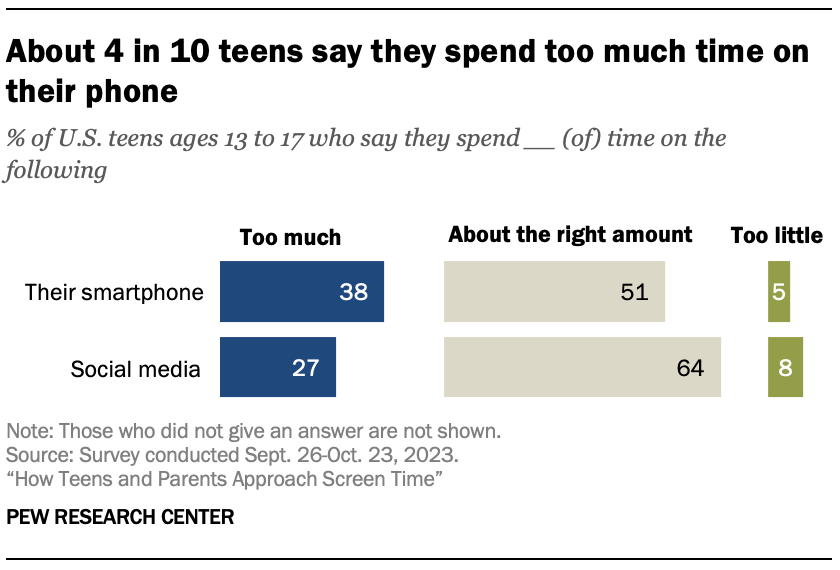
More teens say they spend too much time on their phone or social media than say they don’t spend enough time on them. We found that 38% of teens say they spend too much time on their smartphone. About a quarter say the same regarding their social media use. 2
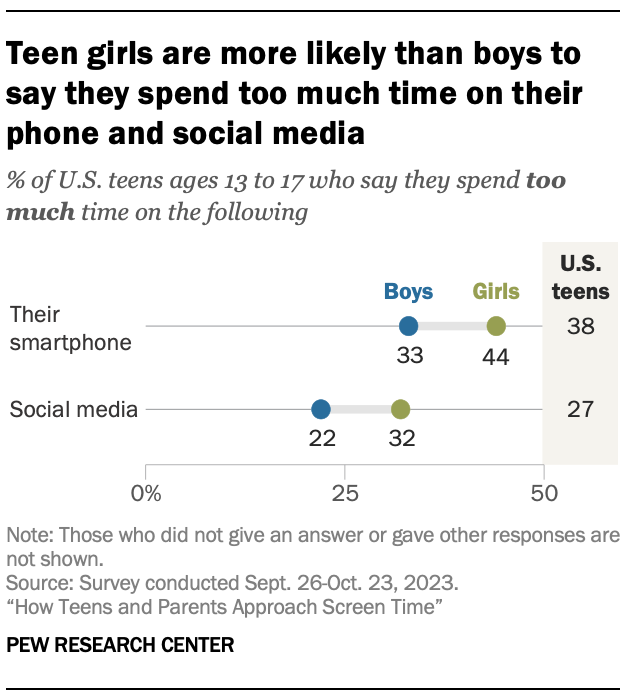
But the largest shares say the amount of time they spend on their phone (51%) or on social media (64%) is about right. Relatively few teens say they don’t spend enough time with these technologies.
Views on this differ by gender. Teen girls are more likely than boys to say they spend too much time on their smartphone (44% vs. 33%) or social media (32% vs. 22%).
Teens’ efforts to curb their screen time
A minority of teens have taken steps to reduce their screen time. Roughly four-in-ten teens (39%) say they have cut back on their time on social media. A similar share says the same about their phone (36%).
Still, most teens have not limited their smartphone (63%) or social media (60%) use.
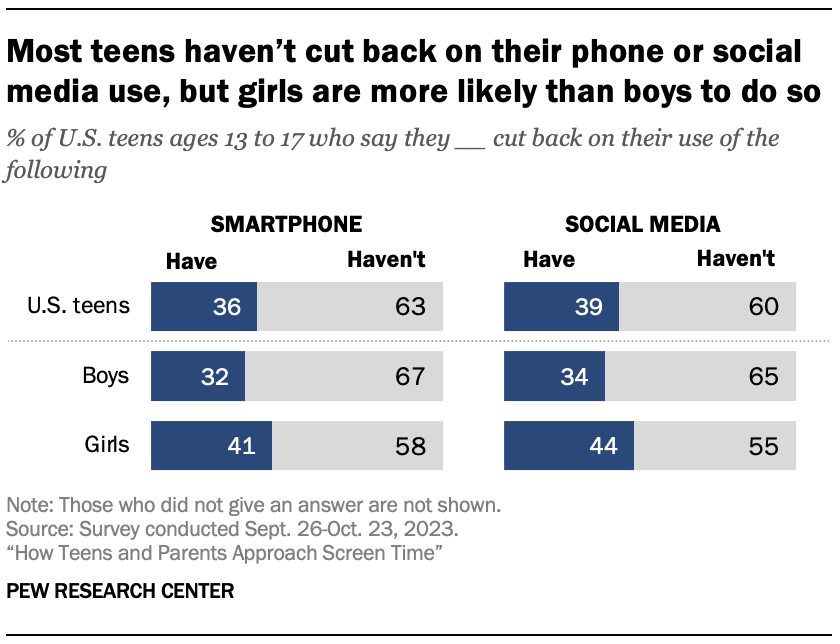
How teens’ behaviors vary by gender
About four-in-ten or more girls say they have cut back on their smartphone or social media use. For boys, those figures drop to roughly one-third.
How teens’ behaviors vary based on their screen time
Teens who report spending too much time on social media and smartphones are especially likely to report cutting back on each. For instance, roughly six-in-ten teens who say they are on social media too much say they have cut back (57%). This is far higher than the 32% among those who say they are on social media too little or the right amount.
How teens feel when they don’t have their phone
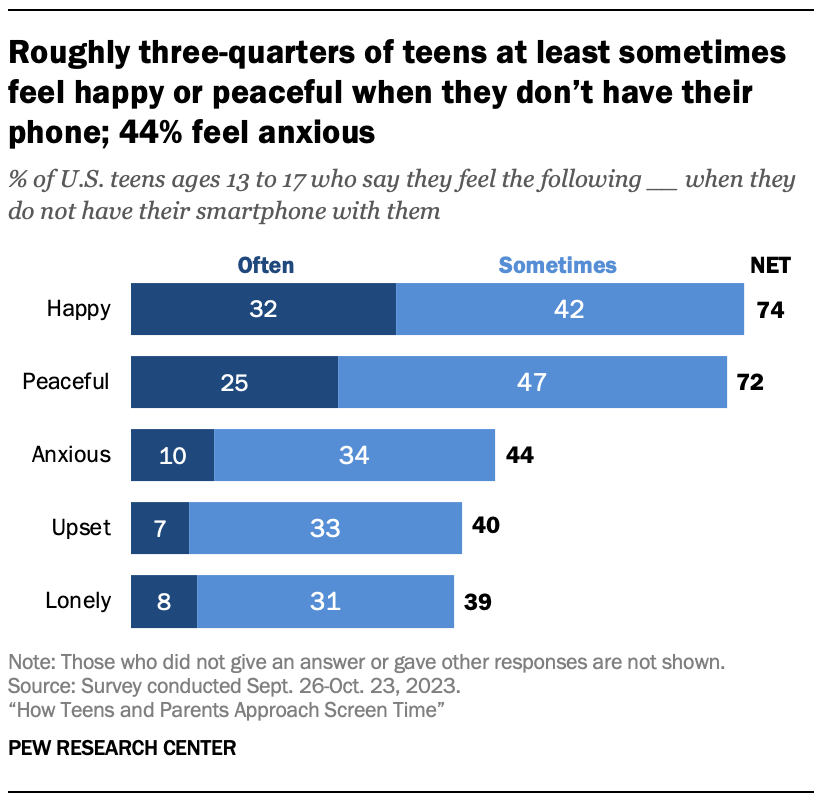
Teens encounter a range of emotions when they don’t have their phones, but we asked them about five specific ones. Roughly three-quarters of teens say it often or sometimes makes them feel happy (74%) or peaceful (72%) when they don’t have their smartphone.
Smaller but notable shares of teens equate not having their phone with more negative emotions. Teens say not having their phone at least sometimes makes them feel anxious (44%), upset (40%) and lonely (39%).
It is worth noting that only a minority of teens – ranging from 7% to 32% – say they often feel these emotions when they’re phone-less.
Teens’ feelings on this differ by some demographic factors:
- Age and gender: Older girls ages 15 to 17 (55%) are more likely than younger girls (41%) and teen boys who are younger (41%) and older (40%) to say they feel anxious at least sometimes when they don’t have their smartphone.
- Gender: 45% of teen girls say not having their phone makes them feel lonely regularly, compared with 34% of teen boys.
Do teens think smartphones are negatively impacting young people?
As smartphones have become a universal part of teen life, many have asked what impact, if any, phones are having on today’s youth.
Teens shared their perspectives on smartphones’ impact on people their age and whether these devices have made certain aspects of growing up more or less challenging.
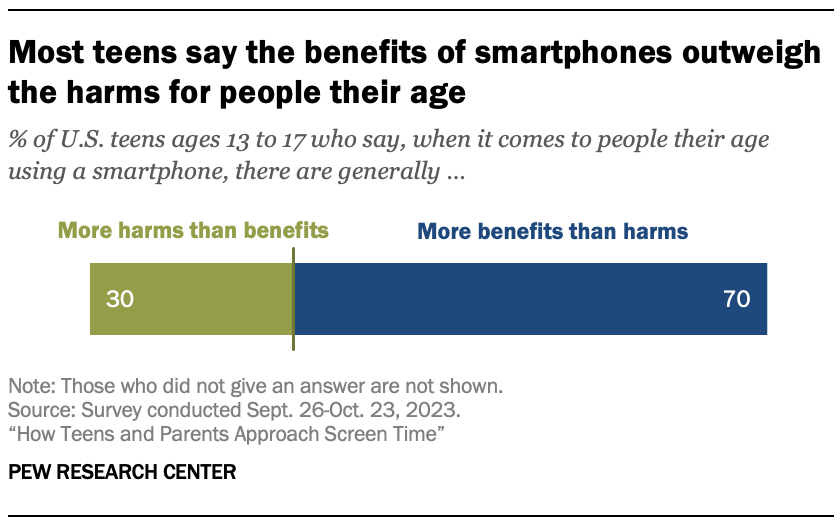
Most teens think the benefits of smartphones outweigh the harms for people their age. Seven-in-ten teens say smartphones provide more benefits than harms for people their age, while a smaller share (30%) take the opposing view, saying there are more harms than benefits.
Teens’ views, by gender and age
Younger girls ages 13 and 14 (39%) are more likely than older teen girls (29%) and teen boys who are younger (29%) and older (25%) to say that the harms of people their age using smartphones outweigh the benefits.
The survey also shows that teens see these devices’ impacts on specific aspects of life differently.
More teens believe smartphones make it easier, rather than harder, to be creative, pursue hobbies and do well in school. Majorities of teens say smartphones make it a little or a lot easier for people their age to pursue hobbies and interests (69%) and be creative (65%). Close to half (45%) say these devices have made it easier for youth to do well in school.
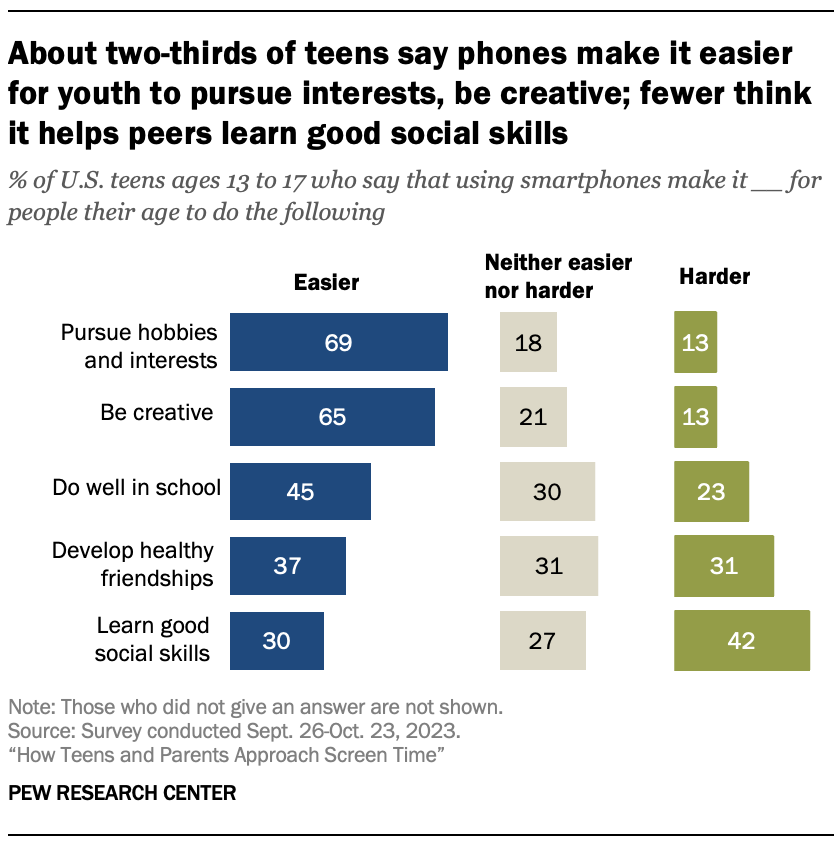
Views are more mixed when it comes to developing healthy friendships. Roughly four-in-ten teens say smartphones make it easier for teens to develop healthy friendships, while 31% each say they make it harder or neither easier nor harder.
But they think smartphones have a more negative than positive impact on teens’ social skills. A larger percentage of teens say smartphones make learning good social skills harder (42%) rather than easier (30%). About three-in-ten say it neither helps nor hurts.
How parents navigate raising teens in the smartphone age
With the rise of smartphones, today’s parents must tackle many questions that previous generations did not. How closely should you monitor their phone use? How much screen time is too much? And how often do phones lead to disagreements?
We developed a set of parallel questions to understand the perspectives of both parents and teens. Here’s what we found:
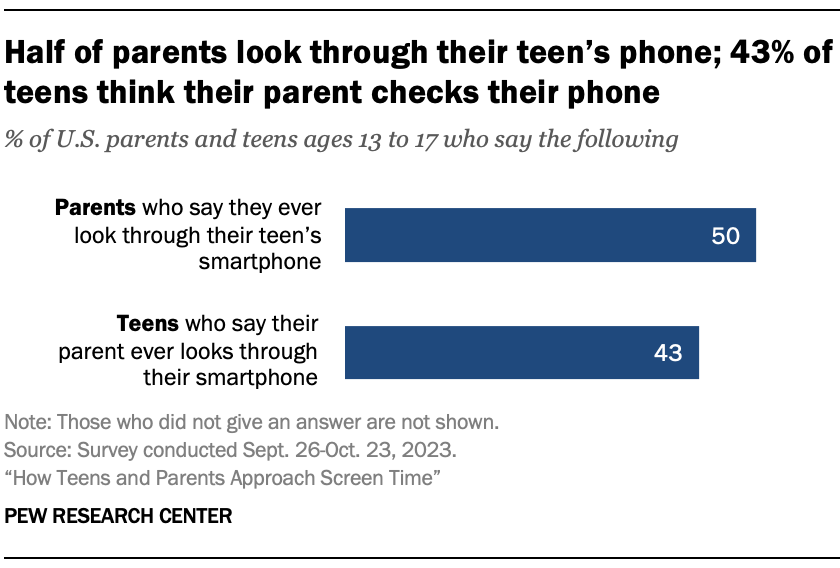
It’s common for parents to look through their teen’s phone – and many of their teens know it. Half of parents of teens say they look through their teen’s phone. When we asked teens if they thought their parents ever look through their phones, 43% believed this had happened.
Whether parents report looking through their child’s smartphone depends on their kid’s age. While 64% of parents of 13- to 14-year-olds say they look through their teen’s smartphone, this share drops to 41% among parents of 15- to 17-year-olds.
Teens’ accounts of this also vary depending on their age: 56% of 13- to 14-year-olds say their parent checks their smartphone, compared with 35% of teens ages 15 to 17.
How often do parents and teens argue about phone time?
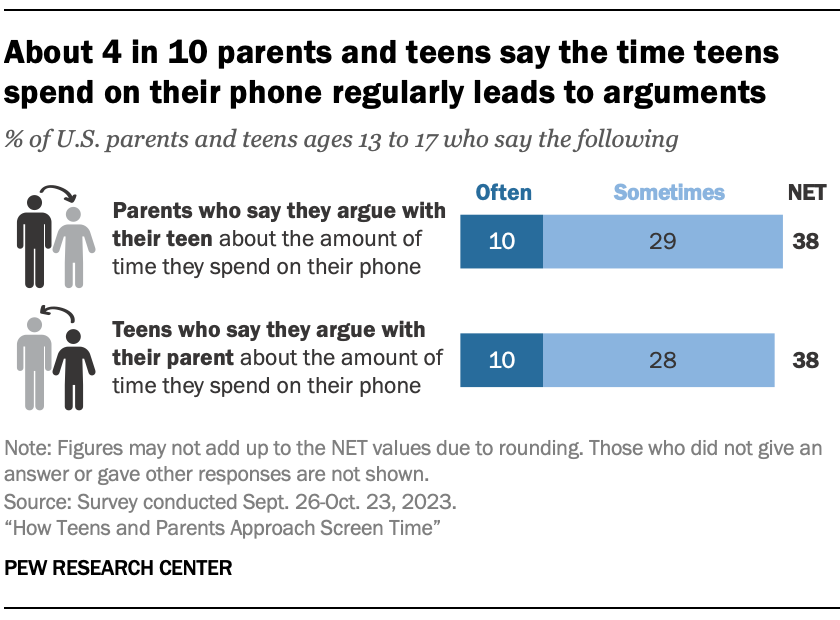
Parents and teens are equally likely to say they argue about phone use. Roughly four-in-ten parents and teens (38% each) say they at least sometimes argue with each other about how much time their teen spends on the phone. This includes 10% in each group who say this happens often .
Still, others say they never have these types of disagreements. One-quarter of parents say they never argue with their teen about this, while 31% of teens say the same.
Teens’ and parents’ views, by race and ethnicity
Hispanic Americans stand out for reporting having these disagreements often. While 16% of Hispanic teens say they often argue with their parent about how much time they’re spending on their phone, that share drops to 9% for White teens and 6% for Black teens. 3
A similar pattern is present among parents. Hispanic parents (19%) are more likely than White (6%) or Black (7%) parents to say they often argue with their teen about this.
Teens’ views, by frequency of internet use
The amount of time teens report being online is also a factor. About half (47%) of teens who report being online almost constantly say they at least sometimes argue with their parent about the amount of time they spend on their phone, compared with those who are online less often (30%).
How much do parents prioritize tracking their teen’s phone use?
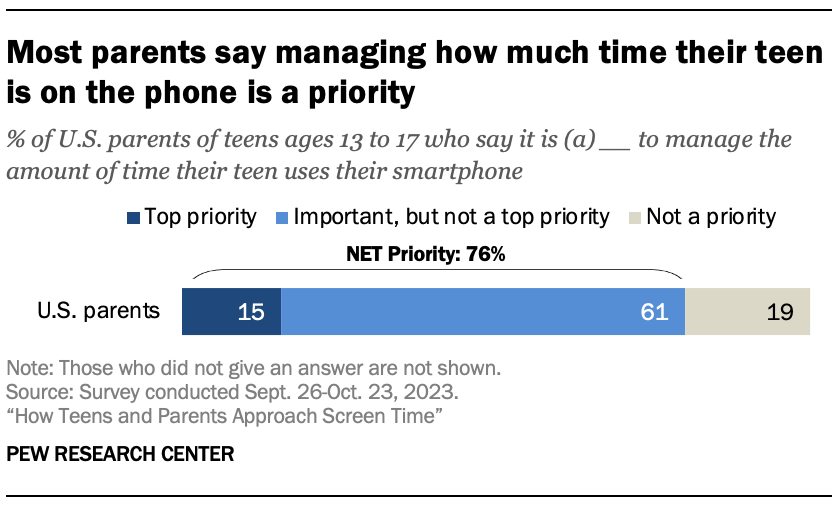
Most parents prioritize managing the amount of time their teen spends on the phone. Roughly three-quarters of parents (76%) say managing how much time their teen spends on the phone is an important or a top priority. Still, 19% of parents don’t consider this a priority.
Parents’ views, by race and ethnicity
Majorities of parents across racial and ethnic groups think of this as a priority. But some groups stand out for how much they prioritize this. For example, Hispanic (25%) or Black (24%) parents are more likely to say managing how much time their teen is on the phone is a top priority. That share drops to 10% among White parents.
Parents’ views, by household income
We also see differences between the lowest and highest income households: 22% of parents whose annual household income is less than $30,000 consider managing the amount of time their teen is on the phone a top priority, compared with 14% of those whose household income is $75,000 or more a year. Those whose household income is $30,000 to $74,999 a year do not meaningfully differ from either group.
Do parents set time limits on their teen’s phone use?
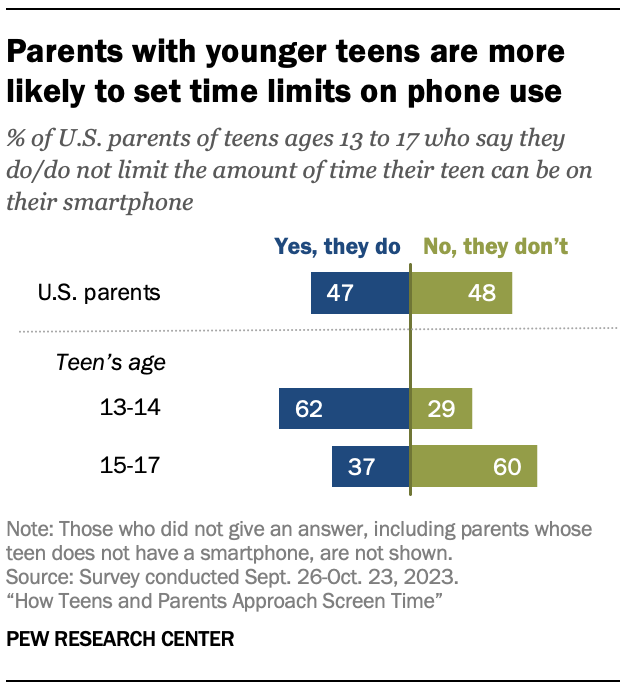
There’s a nearly even split between parents who restrict their teen’s time on their phone and those who don’t. About half of parents (47%) say they limit the amount of time their teen can be on their phone, while a similar share (48%) don’t do this.
Parents’ views, by teen’s age
Parents of younger teens are far more likely to regulate their child’s screen time. While 62% of parents of 13- to 14-year-olds say they limit how much time their teen can be on their phone, that share drops to 37% among those with a 15- to 17-year-old.
How difficult is it for parents to keep up with their teen’s phone use?
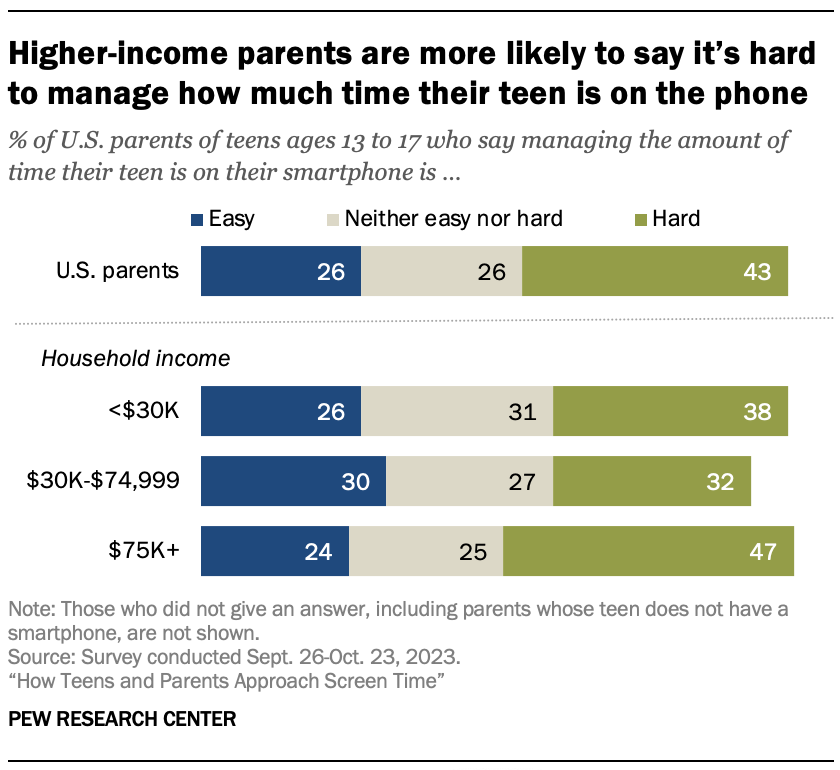
Managing screen time can feel like an uphill battle for some parents. About four-in-ten say it’s hard to manage how much time their teen spends on their phone. A smaller share (26%) says this is easy to do.
Another 26% of parents fall in the middle – saying it’s neither easy nor hard.
Higher-income parents are more likely to find it difficult to manage their teen’s phone time. Roughly half (47%) of parents living in households earning $75,000 or more a year say managing the amount of time their teen is on their phone is hard. These shares are smaller among parents whose annual household income falls below $30,000 (38%) or is between $30,000 and $74,999 (32%).
Parents’ own struggles with device distractions, screen time
Teens aren’t the only ones who can be glued to their phones. Parents, too, can find themselves in an endless cycle of checking emails , text messages and social media.
With that in mind, we asked parents to think about their own screen time – both the time they spend on their phone, and if it ever gets in the way of connecting with their teen.
Do parents think they spend too much time on their phone?
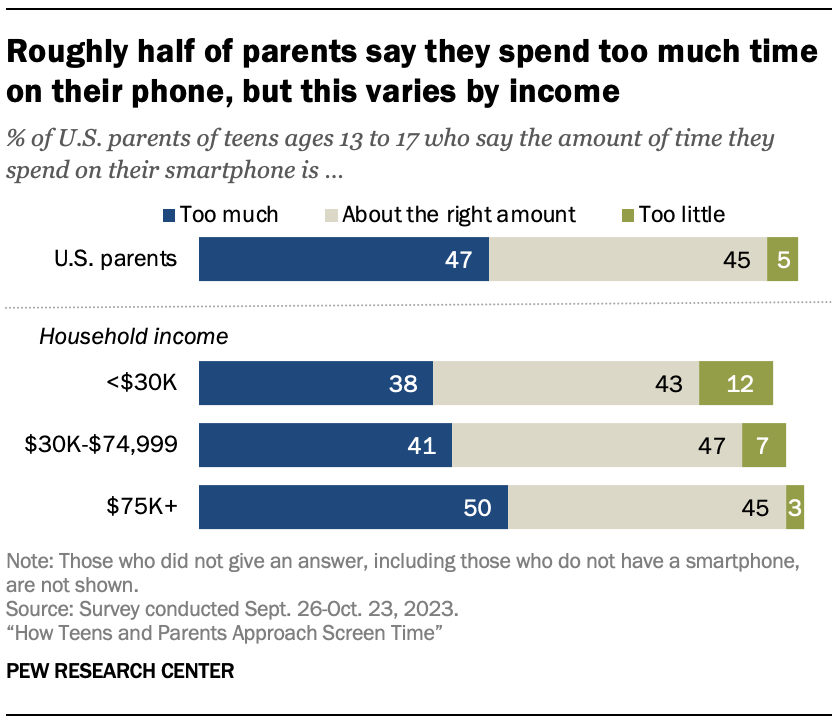
Like teens, parents are far more likely to say they spend too much rather than not enough time on their phone. About half of parents (47%) say they spend too much time on their smartphone. Just 5% think they spend too little time on it. And 45% believe they spend the right amount of time on their phone.
Parents’ views differ by:
- Household Income: 50% of parents with annual household incomes of $75,000 or more say they spend too much time on their phone. This share drops to 41% among those living in households earning $30,000 to $74,999 a year and 38% among those earning under $30,000.
- Race and ethnicity: 57% of White parents believe they spend too much time on their phone, compared with 38% of Black parents and 34% of Hispanic parents.
How often are parents distracted by their phone when talking with their teen?
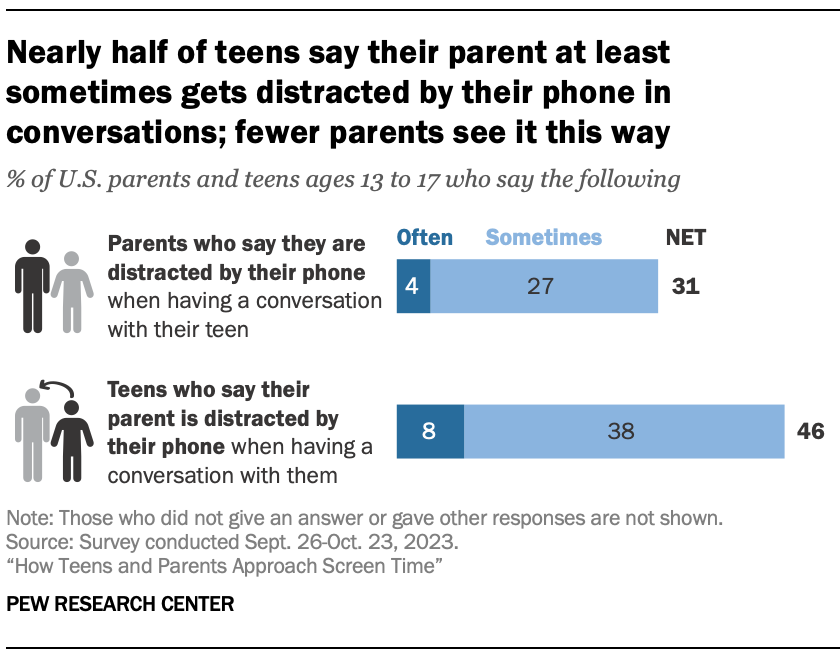
When it comes to distracted parenting, parents paint a rosier picture than teens. Nearly half of teens (46%) say their parent is at least sometimes distracted by their phone when they’re trying to talk to them, including 8% who say this happens often.
But when parents were asked to assess their own behavior, fewer – 31% – say this happens regularly.
- Throughout this report, “teens” refers to those ages 13 to 17 and “parents” refers to those with a child ages 13 to 17. ↩
- A 2018 Center survey also asked U.S teens some of the same questions about experiences and views related to smartphone and social media. Direct comparisons cannot be made across the two surveys due to mode, sampling and recruitment differences. Please read the Methodology section to learn more about how the current survey was conducted. ↩
- There were not enough Asian respondents in the sample to be broken out into a separate analysis. As always, their responses are incorporated into the general population figures throughout the report. ↩
Sign up for our Internet, Science and Tech newsletter
New findings, delivered monthly
Report Materials
Table of contents, teens and internet, device access fact sheet, teens and social media fact sheet, a declining share of adults, and few teens, support a u.s. tiktok ban, teens, social media and technology 2023, about 1 in 5 u.s. teens who’ve heard of chatgpt have used it for schoolwork, most popular.
About Pew Research Center Pew Research Center is a nonpartisan fact tank that informs the public about the issues, attitudes and trends shaping the world. It conducts public opinion polling, demographic research, media content analysis and other empirical social science research. Pew Research Center does not take policy positions. It is a subsidiary of The Pew Charitable Trusts .
Skip to content
Read the latest news stories about Mailman faculty, research, and events.
Departments
We integrate an innovative skills-based curriculum, research collaborations, and hands-on field experience to prepare students.
Learn more about our research centers, which focus on critical issues in public health.
Our Faculty
Meet the faculty of the Mailman School of Public Health.
Become a Student
Life and community, how to apply.
Learn how to apply to the Mailman School of Public Health.
Social Media and Teen Mental Health: A Complex Mix
There is strong evidence to suggest that teenagers in the United States are collectively in the midst of a mental health crisis, as rates of both depression and suicide have climbed in recent years. Could the popularity of social media among young people be to blame?
Melissa DuPont-Reyes, PhD, MPH is an Assistant Professor of Sociomedical Sciences and Epidemiology
Melissa DuPont-Reyes , assistant professor of sociomedical sciences and epidemiology, says the answer may not be as simple as you think. She is leading a new study that takes a holistic perspective, broadening the focus from how the use of TikTok, Instagram, and other social media platforms can harm mental health to include an understanding of how they can be protective, too.
The National Institutes of Mental Health -funded longitudinal study is focused on Latinx adolescents, who use social media more than all other racial/ethnic or age groups, nationally. Beyond a simple measure of the frequency of social media use, Dupont-Reyes and colleagues will drill down into the diverse content young people encounter, including Spanish-language, Latinx-tailored, and English-language posts on a variety of platforms.
The study will collect data on both protective aspects like anti-stigma awareness campaigns and symptom support, as well as negative effects such as stigmatizing content, hate speech, and cyber-bullying. Researchers will examine how these exposures drive youths’ self-perception, help-seeking, and mental health outcomes, as well as the mediating role played by peers and family members.
To accomplish her study objective, in part, Dupont-Reyes will utilize validated, culturally appropriate survey assessments she developed as part of a project funded through a Robert Wood Johnson Foundation Pioneering Ideas Award. As part of the new study, young people will have the chance to research the question and have a say in how to address it through a process called Youth Participatory Action Research.
When it comes to social media’s effects on an adolescent mental health, Dupont-Reyes hypothesizes that context matters quite a lot. Her preliminary work has shown that for some youth, social media can be a lifeline. For instance, youth who are unaccompanied minors migrating, are LGBTQI+ in nontolerant settings, have a disability such as a speech impediment or even mental illness, or have experienced police brutality, all report that social media can be empowering as a tool to make their voices heard while also lending support and resources.
“I hope that my project demonstrates a more diverse portrait of adolescents in the U.S., and globally, as well as the social media that they encounter, and specifies the contexts in which social media can be beneficial to mental health and the contexts in which it might be harmful,” she says.
DuPont-Reyes says the evidence generated from the project could inform policies that are more equitable, accountable, and transparent—ultimately to create a safer technological landscape for diverse populations to promote mental health on a population level. At the same time, its findings can reach parents, teachers, the tech industry, health care providers, and others with its message that vilifying social media is not the answer.
“I hope my research can inform a more holistic and equitable approach to creating a safer social media environment for youth that doesn’t solely require restricting technology,” she says.
Related Information
Meet our team, melissa dupont-reyes, phd, mph.
New Florida Law Aims to Get Kids Off Social Media. Will It Work?

- Share article
Florida will have one of the country’s most restrictive social media bans for minors under a bill signed by Gov. Ron DeSantis on March 25.
The law , which will take effect on Jan. 1, prohibits social media platforms from allowing children younger than 14 to have an account. For 14- and 15-year-olds, social media platforms must require parental permission before allowing them to set up accounts.
Addressing adolescents’ worsening mental health recently has become a top priority for school, district, state, and federal leaders as young people struggle with record-high rates of depression and anxiety .
Much of the conversation around the mental health crisis has focused on young people’s constant use of cellphones and social media. Some states, including Florida, already ban or are considering banning cellphones in classrooms . More than 200 districts have sued major social media companies over the youth mental health crisis.
“We dug into the research showing the negative effects of social media on children, and it directly pointed to the addictive features these companies develop to keep our kids hooked,” Florida House Speaker Paul Renner said in an email statement to Education Week.
Florida’s social media ban doesn’t target specific platforms. Instead, the bill says that the law applies to any platform where at least 10 percent of daily active users are children younger than 16 who use it for two hours or more a day; that uses “addictive” features, such as infinite scrolling; and that uses algorithms that analyze user data to handpick content for users.
Most social media platforms already state in their policies that children younger than 13 aren’t allowed to create accounts. But the law requires these platforms to actually verify the age of its users. It leaves it up to the companies to determine how to meet the requirements. If a social media platform is found in violation, the state Department of Legal Affairs may fine the platform up to $50,000 per violation. Parents or caregivers could also file lawsuits against the platforms.

Similar bans in other states have run into legal issues
Arkansas, California, Ohio, and Utah passed similar bans last year on kids using social media , but none of those laws has taken effect yet because of legal issues. Federal judges have stopped the legislation from taking effect over concerns that the bans violate kids’ free speech rights and that age verifications are unconstitutional.
Renner said during the bill signing that he expects social media companies to file lawsuits, but he’s confident the state will beat them, the Associated Press reported .
Carl Szabo, the vice president and general counsel for NetChoice, called the law “unconstitutional,” because it “infringes on Floridians’ First Amendment rights,” in an email statement to Education Week.
It’s “bad policy because of the data collection on Floridians by online services it will in effect require. This will put their private data at risk of breach,” Szabo added.
NetChoice is a trade association of online businesses that advocate free expression and free enterprise on the internet. It includes TikTok, Meta (the parent company of Instagram and Facebook), and Snap (the parent company of Snapchat). The organization has filed lawsuits against similar legislation in Arkansas, California, and Utah.
The Florida law has a contingency plan to put in motion if a court decides to prohibit the enforcement of the section that requires parental consent for 14- and 15-year-olds to use social media. It says in that case, the law will just prohibit anyone 15 years old or younger from using social media.
“It almost seems like they [the state] were preemptively punishing [anyone who tries to file a lawsuit], saying ‘All right, if you won’t give us this, we’re going to be even stricter,’” said Amelia Vance, the president of the Public Interest Privacy Center, which advocates effective, ethical, and equitable privacy safeguards for all children and students.

‘We just don’t know’ if bans work
Vance is skeptical that Florida’s ban will make children safer online. Kids will find ways around these restrictions if they really want to be on those platforms, she said.
“The approach that is most likely going to be effective here is the one that says, ‘OK, kids are going to be online. Let’s give them special protections when they are,” Vance said. The state’s “Digital Bill of Rights,” which passed last year and takes effect in July, would probably be more effective because it puts in place protections around what data can be collected and places limits around how the data can be used, she said.
Kris Perry, the executive director of Children and Screens, a nonprofit organization that seeks to understand and address the implications of digital media on child development, said a ban “will protect kids from the harms related to social media,” but it will also prevent them from “accessing the benefits.”
“It’d be really important to study whether or not the ban accomplished its intended goal,” Perry said. “We just don’t know, without studying the aftereffects of whether that was an effective strategy.”
In Florida, the statewide ban on students using cellphones during instructional time that went into effect last year has had a positive impact in some schools on student behavior and learning, according to Renner.
“We are hopeful that steering kids toward the real world and away from a warped digital world will result in even more positive outcomes [for student learning],” Renner said in the statement to Education Week.

Equipping students with the right skills
For students, the focus shouldn’t be on restriction, said Ava Havidic , 18, a senior at Millennium 6-12 Collegiate Academy in Broward County, Fla.
“When you ban things or when you restrict things, sometimes, it’s going to be like a green light for students to say, ‘OK, how can I override that? How can I find my way to use it still?’” said Ava, who serves as a student adviser for the Broward County school board.
The focus should instead be on “explaining why it’s important to limit usage” and “formulating a mindset at a young age so they can learn how to use it correctly,” she said.
Kids will become adults, and they’re going to be using these platforms, and if we limit their use and don’t teach them the right way to use it, “they’re not going to be prepared,” she added.
Sign Up for The Savvy Principal
Edweek top school jobs.

Sign Up & Sign In


COMMENTS
Social media pros and cons are often debated as the influence of these platforms continues to grow. Social media is a term that describes a person's ability to affect other people's social thinking in a community. ... This essay was donated by a student and is likely to have been used and submitted before. I Need a Unique Paper Order a ...
250 Words Essay on Pros and Cons of Social Media Introduction. Social media has become an integral part of modern society, shaping the way we communicate, learn, and engage with the world around us. Yet, it is a double-edged sword, with its advantages and disadvantages intricately linked. Pros of Social Media
Argumentative essays take a fair look at the pros and cons of social media and how it affects student life. They look at the many different ways social media affects student life. For instance, platforms like GradesFixer provide a diverse range of essay examples that address the complexities of social media's role in education.
Long Essay on Pros and Cons of Social Media 500 Words in English. Long Essay on Pros and Cons of Social Media is usually given to classes 7, 8, 9, and 10. People socialize and interact with others in their day to day life, be it their family, friends, colleagues, or it can even be strangers.
This addiction hampers with the academic performance of a student as they waste their time on social media instead of studying. Social media also creates communal rifts. Fake news is spread with the use of it, which poisons the mind of peace-loving citizens. In short, surely social media has both advantages and disadvantages.
The dangers of social media are massive, and despite the fact that it has numerous benefits, the effects of social media can lead to harmful results sometimes. 1. Lack of Security. As social media has become more accessible to anyone with an internet connection, people have become more vulnerable to hacking.
Even before the COVID-19 pandemic, rates of depression, anxiety, and suicide in young people were climbing. In 2021, more than 40% of high school students reported depressive symptoms, with girls and LGBTQ+ youth reporting even higher rates of poor mental health and suicidal thoughts, according to data from the U.S. Centers for Disease Control and Prevention (American Economic Review, Vol. 112 ...
Social Media can reduce the time spent on studies. The "perfect life/body" images can lead to low self-esteem in young people through social media. Bullying has moved to an online arena which is more difficult to track and remedy. Cases of teenage anxiety and depression are rapidly rising.
Social media platforms enable students to connect and stay in touch with friends, family, and peers from all over the world. It allows them to maintain relationships and foster a sense of community, even across geographical boundaries. 2. Access to Information and Educational Resources.
Key points. Social media has both positive and negative effects on well-being in youth. Social media impacts four distinct areas for youth: connections, identity, learning, and emotions. More than ...
The above arguments make using social media by individuals with a debatable issue, and this is why a lot of students are required to write an essay on social media. So, here are some incredible tips to help you out in writing an essay on social media even if you don't have marketing skills. Structure of Social Media Essay
Social Media definitely has a positive side as well for the people using it. One of the most significant advantages, or probably the reason why the concept was created, was to communicate. Social media helps us contact/stay in touch with people we love, celebrities who we admire, or connect with new individuals.
Students in the academic world are frequently assigned essays about the impact of social media on numerous elements of our lives, such as relationships, politics, and culture. These essays necessitate a thorough comprehension of the subject matter, critical thinking, and the ability to synthesize and convey information clearly and succinctly.
4. Addiction: The addictive part of the social media is very bad and can disturb personal lives as well. The teenagers are the most affected by the addiction of the social media. 5. Time Consuming: Social media has made the teenagers to lose the emotional connection with their families and friends.
Best Social Media Essay Titles for Students. The next step after choosing a topic is creating a proper title. It must be catchy because a student's aim is to attract the reader's attention. It is not difficult to choose social media essay titles. ... Writing a pros and cons of social media essay one should give some convincing examples ...
Educators and parents are essential in guiding students through the potential pitfalls of social media. They can play a pivotal role in promoting digital literacy and critical thinking skills, teaching students to discern reliable information from misinformation and encouraging them to approach online content with a careful eye. It is vital to emphasize balance, helping students set boundaries ...
Essay on Social Media in 150 words. Social media has revolutionized communication and connectivity, allowing individuals to share content, connect with others, and participate in virtual communities. While it brings opportunities for instant communication and global connectivity, it also presents challenges.
The Pros Of Social Media. One of the most notable pros of social media is its ability to connect people all over the world. With just a few clicks, you can instantly connect with family members or friends who live thousands of miles away. Platforms like Facebook, Instagram, and Twitter allow us to keep up with our loved ones in real time.
Social media campaigns and initiatives raise awareness about cultural heritage conservation, advocate for the protection of endangered languages and traditions, and celebrate the richness of human ...
Nevertheless, social media plays a huge role in our society, it connects people all over the world, provides an opportunity to work or study being at home and it gives space for self-expression. Involving in numerous sorts of social media has become a daily activity for most teenagers and grown-ups.
Essay Sample: Social Media: Pros and Cons First of all, one of the main advantages is that social media allows us to update ourselves from the latest happenings and ... Students looking for free, top-notch essay and term paper samples on various topics. Additional materials, such as the best quotations, synonyms and word definitions to make ...
Pros. As mentioned above, social media has given the society a new platform to access any type of information. Studies have shown that information spreads quicker from social media as Patel 2compared to any other media. "78.5% of traditional media reporters polled used social media to check for breaking news" (www.procon.org).
Students may use social media to share answers to tests. They could use AI tools like ChatGPT to generate convincing, albeit fake, responses to essay prompts. They could also use various technological tools, hidden during tests, to cheat in the moment. These occurrences may be difficult to execute, but they do happen.
The downsides of social media use are getting a lot of attention in 2024. The year started with Facebook founder Mark Zuckerberg getting grilled in a congressional hearing about the negative ...
Teens who report spending too much time on social media and smartphones are especially likely to report cutting back on each. For instance, roughly six-in-ten teens who say they are on social media too much say they have cut back (57%). This is far higher than the 32% among those who say they are on social media too little or the right amount.
Melissa DuPont-Reyes, assistant professor of sociomedical sciences and epidemiology, says the answer may not be as simple as you think.She is leading a new study that takes a holistic perspective, broadening the focus from how the use of TikTok, Instagram, and other social media platforms can harm mental health to include an understanding of how they can be protective, too.
Florida will have one of the country's most restrictive social media bans for minors under a bill signed by Gov. Ron DeSantis on March 25. The law, which will take effect on Jan. 1, prohibits ...
jkssb patwari urdu Written Test 2024 essays on social relevance: Social Media Pros & Cons.